






I learned why the supermarket duopoly is making butter a luxury grocery item last week. Features Editor Hanna patiently explained to me how competition is important to ensure that prices meet demand, and why there being two major supermarkets in Aotearoa means prices inflate to the point of there being $10 blocks of butter. It took about three goes, but I eventually got it (check out the feature for an explainer). And it made me think about scones.
Butter and cheese are key ingredients in cheese scones. Earlier in the year, Critic noticed that the campus scones seemed smaller. The University confirmed our suspicions: “After reviewing costs at the beginning of 2025, it was noted that milk and butter costs, plus other key ingredients including flour had increased, so we decided to maintain our scone price and reduce the size – this was the only product we have reduced in size.” This is known as ‘shrinkflation’. It’s a sneaky way that manufacturers pass on a hidden price increase. By keeping the prices of scones the same, it means that you’re effectively paying more for less.
The University of Otago has a near monopoly of campus scones. Anywhere you go – from St Dave’s cafe to Café Albany, Auahi Ora to the Business School – the scones are made by the University. There isn’t any direct competition for these cheesy morsels, and they can quietly give you less bang for your buck without telling you, in some twisted café edition of Roald Dahl’s The Twits – the story where the husband incrementally makes his wife’s chair taller, making her think she’s shrinking. It’s psychological warfare.
Betrayed, I’ve sought refuge in Dispensary’s bosom. Not only do they have the best coffee on campus (as voted by students in the 2024 census and my daily caffeine habit) and have the best vegetarian sandwich in the tertiary sector (Big Lizard takes the win in the city) – but their scones have captured my heart. Nestled in a steaming, warm pile in a glass display case, these glorious big boys are hefty and the rotating door of flavours are always a pleasant surprise. The pesto and capsicum was a personal favourite.
Deciding that the University needed some direct competition after taking liberties with the size of their scones, I bought one of each and ate them side by side. Dispensary’s was notably larger, whilst the Uni’s had a golden crown of cheese. Both were delicious, but if you’re after value for money,
Dispensary is the clear winner, adopting the student attitude of stretching food across multiple meals. These bad boys give those struggling with the cost of living an excuse to treat themselves. It’s $6, but really $3 per sitting – almost as good value as OUSA’s $4 lunches (almost).
I’m no expert when it comes to baking – one time I used a quarter cup of baking powder in a cake rather than a quarter teaspoon, it was foul – but I can only assume that Dispensary sidestepped the inconvenience of hiked ingredient prices by doing what every broke student has since the dawn of time: getting creative with the recipe. Former Critic food columnist Alice Taylor does just this on her popular Instagram page dedicated to cheap, nutritious cooking (you can read more about her in the feature). One way in which Alice combats the inflated costs of ingredients is by creatively altering recipes to be more cost-effective, like swapping butter for oil and chocolate for cocoa to make budget brownies.
Dispensary’s scones are the innovative, ‘we’llmake-do’ Kiwi student to the University’s decision-makers who reportedly still catered events with sushi whilst cutting courses and staff members to plug that gaping budget hole. The Uni’s small, sad little scones are indicative of the unimaginative, privileged decision-makers who haven’t had to make trade-offs that aren’t by the book – and it shows. In comparison, Dispensary aren’t just feeding students’ stomachs, they’re feeding their souls. After a commerce crash-course on the concept of competition, my mini headto-head definitely won’t affect the University’s scones – you’d need a bigger competitor than Dispensary’s humble business to do that – but to students: if you’re craving a scone as a break from the Depression-era muffins your flatmate’s been cooking, I reckon Dispensary is the way to go.
NINA BROWN
Correction: The online version of the news article ‘Students Waiting Weeks for Mental Health Support’ has been amended to correct inaccuracies. Critic Te Ārohi apologises to Student Health for misrepresenting their services, who offer mental health support for students in need.

Dear Critic,
If you ever wished Albany St had even just one pedestrian crossing, or a bike lane, bad luck - it's not getting an upgrade. To thank we have 7 Councillors and the Mayor, who voted against it, and the owners of A+ Burgers, Eureka, Sushi Station, Leith Liquorland, and The Flying Squid, who publicly campaigned to keep the car parks - because who knows better for 20,000 students than business owners and Mosgiel-based councillors?
Encouraging you to vote
Editor’s response: It’s honestly a miracle no one’s been hit crossing Albany St for their daily $4 lunch at this point
Dear Critical Critic,
I hear my last letter annoyed those who were criticised by it. I'm heartbroken. But for real, we all want to move on. I've got the complaining out of my system, so I hope this BDS drama is finally over. Peace and harmony comrades, I have work to do.
So I'm going to be positive. If the OUSA referendum was truly representative, only 53% of students want BDS. So, I'm happy that the last few rounds of letters have reflected this, giving the 47% of students opposed a voice, free from the fear of heckling. Thanks Critic.
No one likes a sore loser, but at least everyone's been one. So, after two long weeks, I hope those individuals with whom I disagree have finally calmed down. After all, has there ever been such a thing as a sore winner?
From, Neil Hattersley — hopefully not "complicit in genocide"
Editor’s response: Looks like this issue might be a final bout for both.
Who’s Afraid of a Little Politics?
Writing here to address a letter sent in by Neil in the previous issue (#20, 2025) regarding the supposed OSJP coup which has apparently unfolded beneath our collective noses. To be as polite as I can be, this letter expresses what I might charitably call an infantile, juvenile, or barely literate understanding of formal democratic or mass membership politics. Our friend seems convinced, via a ham-fisted gesture at the ACT Party’s result in the 2023 election, that a low turnout for the referendum question which the SGM & BDS vote hinged on invalidates magically any effort to use the formal political infrastructure of OUSA to advance a political goal. This is substantially below what I might expect from my first-year students in terms of comprehension skills. This flailing amounts to a tortured scream of “I tried nothing, and it didn’t work!” with associated toys thrown out of the cot. Cheers!
TJ, PhD student/tutor
Editor’s response: I’d tend to agree with Neil’s letter here where, regardless of your interpretation of whether the 53% of students who voted in the referendum for BDS is “representative” of the student body, both parties have now had their say on the matter. Democracy manifest!
Dear Critic!
I almost screamed with delight when I saw your article about surviving the zombie apocalypse as I am a zombie fanatic and greatly appreciated the chance to nerd out and put the art from it on my wall. I imagine you know your way around this place better than I do as I am unfortunately a fresher, so I was wondering where in Dunedin/on campus would you make your zombie apocalypse base if an apocalypse did occur.
Lots of dorky love, Eli <3
Author’s response: If DCC is being serious then civic centre. If DCC is not serious then I would honestly just want to leave Dunedin. Or like maybe I’d go to OUSA clubs and socs because it hasn’t got many entrances and it has a bunch of vending machines, stuff for lunch and breakfast… plus a brand new roof zombies cant tear in to.
Send letters to the editor to critic@critic.co.nz to be in to win a $25 UBS voucher.
I am writing to you because I don’t trust that writing to the president would mean that these views get expressed to the executive and because you are the only person who spoke out against adopting BDS. I would like to express my severe disappointment in what occurred at the SGM this week. I think that as a student union that represents all students that the SGM represented a farce and a hijacking of legitimate student representation at OUSA. Please refer to the points below:
1) This motion was put forward by a compromised labour-endorsed political representative. As a political representative for OUSA our political representative and all representatives should be advocating for all students regardless of political affiliation. That the Political rep has not resigned, leaving groups of students as underrepresented or not represented in the political arena of OUSA is not democratic. Representation of minorities is fundamental to a fair democratic process.
2) That OUSA has a mandate based on a 53% majority to execute the BDS movement is a creative use of statistics at the least and a major misleading of the student population at the SGM otherwise. A 53% majority yes vote on a referendum 1766 votes in a Student body of 20,000 which has been skewed already by BDS supporters encouraging their constituency to vote yes, and given that those involved in such movements are more likely to be politically active and therefore vote, is not a mandate by any means. Noting this and choosing a balanced course of action is not undemocratic. Maybe the political rep should do a stats course or two.
3) The President of OUSA as the spokesperson of OUSA, given the context of your plea to consider the financial needs of OUSA, disregarded that need and their responsibility to OUSA, the executive and the student body. A president that betrayed the trust of his executive and the student body is not someone who we should trust to represent the student body at any level.
4) Israeli/Jewish and other culturally diverse students already don’t feel comfortable on campus, and they sure as hell wouldn’t have felt comfortable in that SGM speaking out against BDS, we heard many heart felt pleas regarding BDS and equating buying a dominos pizza with actively being complicit in genocide, of course there was no debate or discourse. These comments shut that down and are unhelpful, the entire meeting ran more akin to a Palestine rally than it did a general meeting.
5) OUSA has already increased the price of sauna’s by $1 and I’m now down to reading a critic magazine that’s 12 pages shorter, we’ve already experienced cuts, and you told us OUSA ran a 680k deficit and there was no discussion around it. Simply that OUSA can’t afford to base our morals on a balance sheet. BDS achieved changing the discourse around Palestine and brought awareness to what’s going on, beyond that what has it achieved? I agree that we shouldn’t morally make choices based on a balance sheet but we shouldn’t make it worse because we want to commit to something that’s easy to do and that makes no real difference, there are meaningful ways to support Palestine and BDS is no longer one of them. If BDS is going to cost OUSA, and those costs reduce their ability to continue to provide student services then it’s not better than doing nothing it’s actively a bad strategic choice.
One speaker said that VUWSA adopted a BDS posture and all it cost them was $0 and a spine. To the political rep and president, I would argue that’s all a bit of integrity might cost you. Do the right thing, resign.
Editor’s response: To clarify, this letter was both submitted directly to the Exec and as a letter to the editor to Critic Te Ārohi. The Exec have responded to the author of the letter personally.
Letters should be 150 words or fewer. The deadline is Thursday at 5pm. Get them into Critic by emailing us at critic@critic.co.nz. Letters of a serious nature directly addressing a specific group or individual will not be published under a pseudonym, except in extraordinary circumstances as negotiated with the Editor. Critic Te Ārohi reserves the right to edit, abridge, or decline letters without explanation. Frequently published correspondents in particular may find their letters abridged or excluded. Defamatory or otherwise illegal material will not be printed. We don’t fix the spelling or grammar in letters. If a letter writer looks stupid, it’s because they are.
Dunedin ED wait times are reportedly the “worst in the country,” according to the ODT, with one woman waiting 15 hours to see a doctor with her seriously ill 14-year-old daughter
Feeding a family of four in Aotearoa now costs about $25,000 a year, a bill that’s $10,000 higher than the average Aussie household, and $8,000 higher than Britain –Stuff reports
Over 36,000 nurses, midwives, healthcare assistants, and kaimahi hauora striked last week. “Te Whatu Ora and the Government need to get real and realise it’s patient safety that’s being endangered by their failure to provide sufficient staff,” the NZ Nurses Organisation chief exec told Stuff
An experimental Octagon dessert bar plans to open doors in November, telling the ODT ice cream flavours and cocktails could include salmon, bacon, vanilla, and sauerkraut
Jetstar has been fined $2.25 million for misleading customers over their compensation rights when flights are delayed or cancelled (as they often are), Re:News reports
UniPol is running a September group fitness challenge! Take as many classes as you can in three weeks to win prizes.
The Department of Conservation puts Aotearoa’s population at 695 billion. The number includes plants and animals, in a new campaign to increase awareness about the fragility of nature and drum up funds for its work, RNZ reports
The Life Matters Suicide Prevention Trust are hosting a World Suicide Prevention Day vigil in the Octagon on September 10th from 6pm - 7:30pm. Scan the QR code to donate to their Givealittle
Favian the portrait man is in the Link every Wednesday from 10am-6pm. He advertises his services for the price of a koha, a nice opportunity for students to try something fun as a study break or a gift!
Electric Ave line-up dropped last week, the biggest festival in Australasia. Headlining is Split Enz and Dom Dolla
Law Revue Did Not Suck 6 OUSA President Nearly Lived in a Cage for a Week 7 Execrable: Refusals to Resign & Letters Abound 8
Episode II: Return of the Spud 10
Regional Council Candidates Tempt Students with ‘A Better Deal’ 10
Why You Should Give A Shit About Local Body Elections 14
Māori Gewl 16
Meals for the Maniacal Masses 20
Broke, Hungry, and Over It: How Aotearoa New Zealand’s Supermarket Duopoly Hurts
With not enough tenants to go around, Wellington landlords are “courting people with flashy incentives” including cash bonuses, grocery vouchers, and free power, The Spinoff reports
of the Week 36
But it did suck our blood
From skits to show, Law Revue 2025 did not overstay its welcome (take hints, Med Revue) in showcasing some of the boldest, talented people from the law community – wrapped in a sexy one-and-a-half-hour-long session so we could all get back to our teddy bears on time. The love child of students Charlie Butler and Jack Evans, ‘Twilight: New Moot’ watered down your perception of what the usually pretentious and somewhat frigid stereotype of a law tauira is. Instead, for three nights only, they were funny.
Traditionally at odds, even a med student Critic Te Ārohi spoke to said the show was actually understandable, soothing universal concern for the health of their funny bones. Overall, the skits were as sporadic as ketamine-induced AI slop on Insta reels. It ranged from fish hooks in a urethra, exam worries, UNESCO, 1080 poison, and breathas on the PlayStation; to the struggle of getting a graduate job and typical uni struggles with mould, drug addiction, touch starvation, and being pissed on. All amusing and stylish, but the audience admittedly risked overdosing on whiplash – starting with the opening sketch that claimed that Al Qaeda inspired this year’s Law Revue.
Audience members we spoke to commented that it was nice to see more acting than dancing compared to last year. A very raunchy dance number was on the entrée for this year's law buffet, setting the mood for a very tasteful evening.
The Habeas Chorus, Laws' version of Sex/Sexytet, was immaculate as ever in their song ‘Dumb Ways to Cheat’ (à la ‘Dumb Ways To Die’), and the rest of their repertoire. However, musically-inclined spectators did question the lack of backing vocals, and felt there was a bit of awkwardness without one. Bravely staring down front-row seated reviewers, they shamelessly sang, insisting that “there were worse things to joke about than sex” (in possible reference to an earlier review…). Critic notes that there was a clever balance of creative skits and sex jokes throughout the production.
The best part of the whole thing in Critic’s circle-jerk opinion: our very own digital archivist Will Wray. Video director extraordinaire
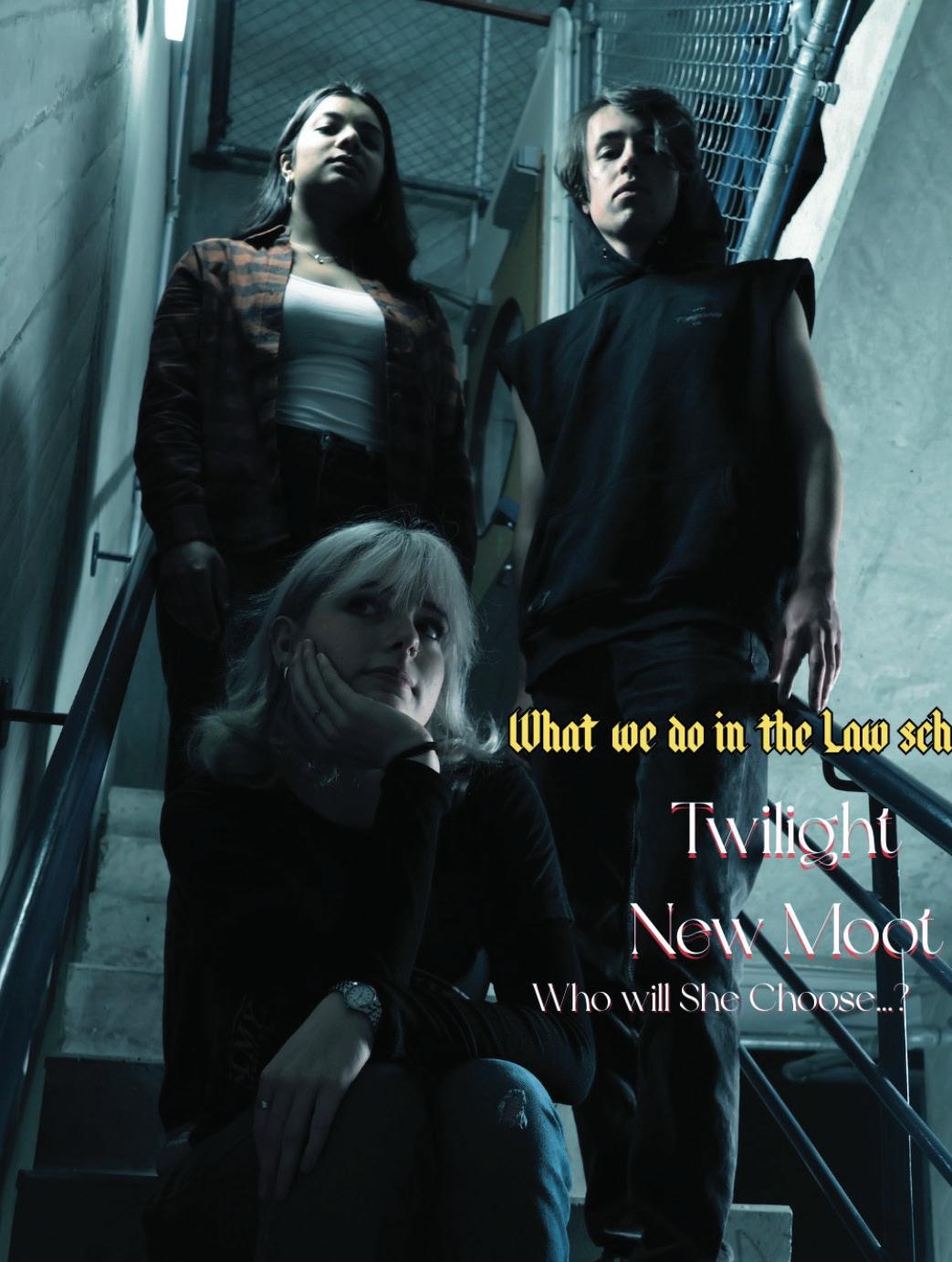
By Harry Almey, Zoe Eckhoff & Ella Grayson Contributor, Staff Writer & Contributor // news@critic.co.nz
captured intimate moments with unprecedented skill. Holy fuck it was pristine. Glorious, beautiful. Critic wept with joy and laughter as former Capping Show lead Jack Hanan made his way to Pound Town. It was totally plot relevant, they swear.
Then there was the infamous Company Law Exam, whose last minute postponement after a leak was the biggest law controversy of the year. The successful comedic punching bag (and elephant in the room) was acknowledged head-on in song, video, and stage. Tired of beating the old horse (9/11 jokes), this recent scandal has entered the stables, ready to be whipped for years to come. We fear (with popcorn in hand) that this event, much like the jelly wrestling law camp, lecturer involvement in law camp, and the year it was cancelled for good, will enter the law pantheon and never leave.
Of course, Lawrat (Jasper Okane), the self-proclaimed “Creative Consultant”, brought his own flair, putting a twist on Taiki Waititi’s What We Do in the Shadows – bringing out the lecturers from their own shadows of being retired theatre kids. And they looove to suck.
With a lot more queerness than previous years, the whole production definitely had an indie Y2K vibe with amazing fashion and wardrobe. They had their very own Charlie XCX, who created another hit ‘House of Lords’ tune railing against the recent antitrans UK Supreme Court ruling, and challenging the law's authority over gender identity. The production even ended with the main lovers breaking apart, with ‘Bella’ and her fem best mate ‘Jayjay’ falling in love and scissoring into the sunset. Winston Peters probably would have thought this show was “woke”. We thought it was awesome. Rock on.
While Lawrat's cameo made us deeply nostalgic, the consensus was that this is the best Law Revue in recent years: entertaining, easy to follow, and well-executed, apart from minor audio issues. Props to you Law Revue, it looks like you’ve taken the crown of the best revue of the year.

“A comparable amount of risks to the Six60 concert”
If you ever wanted to watch the OUSA President live in a literal cage for a week, unfortunately your dreams have been locked away. From the 25th to the 29th of August, OUSA President Liam White had planned to live in a cage to raise awareness of poor student housing. Critic Te Ārohi has a scoop on the cage that never happened.
When not being trashed by freshers at the annual Toga Party or peppered with sun-soaking lunch-timers on that rare Dunner stunner, Union Lawn generally stays pretty empty. Inspired by past actions of a past OUSA President, Logan Edgar, Liam soon cooked up his own stunt. Protesting the Education (Freedom of Association) Amendment Act 2011, Edgar lived in a cage (a flat-deck trailer with a cage) for 48-hours to protest voluntary membership of student associations – an Act Party bill whose consequences President Liam is still dealing with over a decade later.
But Liam’s fight is different. He chose to focus on poor student housing in Ōtepoti, a topic he is truly passionate about. “Consistently talking both to students and the wider community, housing is continually noted as one of the biggest challenges to students,” he told Critic (prompting flashbacks to black mould lined windowsills and visible clouds of breath).
As an example, Liam noted a recent story from his good mate Vice Chancellor Grant Robertston who, whilst on a tour with Campus Watch, didn’t reckon his flat had changed in 50 years.
“Which [is a] funny story, but for the students who live there every day poses a serious challenge now [...] the quality has always been poor,” said Liam. It’s obviously a close story to Grant’s heart too, being aware of The Cage stunt itself. If it were to go ahead, Critic was looking forward to witnessing their regular meeting being held on Union Lawn.
Another pipe dream of the project was the idea of mailing the only key to the cage to the Chrises at the seat of housing power: Prime Minister Chris Luxon and Minister of Housing Chris Bishop. Included would be a letter inviting Christopher Luxton to address Otago’s student housing concerns (and give Liam his freedom). The letter reads, “Students are paying increasingly high rents for homes that are too often cold, damp, and unsafe. Our members tell us of black mould, broken heat sources, persistent leaks, and a fear of speaking up to landlords for fear of eviction or blacklisting.”
Liam had four key asks of the Government: 1) Introduce a mandatory Rental Warrant of Fitness; 2) Extend the Winter
By Gryffin Blockley News Editor // news@critic.co.nz
Energy Payment to all full-time students in New Zealand; 3) Launch a Parliamentary Inquiry into student accommodation in Aotearoa; and 4) To pretty please let him out of the cage so he could finally pee. “We welcome you kindly to come enjoy a cold Speight’s Summit Ultra 0 with us and discuss the issues facing students,” the letter concluded. Unfortunately, for many practical reasons, this aspect of the stunt was abandoned.
As planning began, it soon became evident that living in a cage was a complex undertaking, one requiring months of prep. Building the cage itself (or the ‘The Igloo’) was just the start, which was essentially some pieces of wood whacked together by Residential Rep Callum, with progress pictures sparking Saw trap comparisons – not too glamorous for the president.
And then there’s the health and safety plan. Written by Liam himself with help from the OUSA Events team, the hazards register is thorough and extensive, to say the least. It’s 29 pages long. Liam described the amount of risks as "comparable to the Six60 concert” earlier in the year. Every potential hazard has been thought of – hypothermia, sunstroke, terrorism (a real consideration if the Prime Minister were to show up), darkness, and intoxicated participants. You name it, it’s probably featured. If anything, the cage is a masterclass in event planning (future career pivot, Liam?).
With health and safety risks continuing to build and a busy few weeks for OUSA (including the biggest Student General Meeting in the association’s recent history), Liam’s time in The Cage never came to fruition. And as OUSA enters its Executive election period, spanning from Monday September 8th until Thursday September 25th, stunts like these are not allowed. For now, then, the advocacy will have to continue from the safety of his warm office.
While Liam’s cage is on an indefinite hiatus, he leaves some parting advice as tauira are preparing for flat signings and moving dates. The “big advice” he'd give to students (“and it's a bit lame”) is to take your tenancy agreement to OUSA Student Support before signing, who can help to spot any shady clauses or failure to meet healthy homes standards, and document every aspect of your flat on move-in day, like taking pictures of an existing crack in a window to prove you’re not responsible. For any issues that crop up during tenancy, Liam encourages you to go through Student Support’s purple door.
Until then, keep an eye out for the OUSA President’s next cunning plan.
If they don’t stop with these two hour meetings istg
In bombshell news, Political Representative Jett Groshinski was asked to resign by two-thirds of the OUSA Executive at their most recent meeting on Thursday, August 28th. The Exec told Critic Te Ārohi that the decision was “not made lightly,” but a sequence of questionable behaviour from Jett forced their hand. A formal letter is yet to be drafted but, via media statements and his own channels, Jett’s answer has been clear: “I will not resign.”
The saga began in June when Jett was announced by the ODT as a Labour-endorsed candidate for the Local Body Elections (LBE) – to the surprise of the Exec, who had no idea of his intentions to run. Strike one. It prompted a tense Exec meeting, held largely in confidential committee, with plenty of “what the fuck” facial expressions and straight-up requests for his resignation there and then.
To answer everyone’s question of how he would be a “neutral” Political Rep whilst running for Labour, Jett’s homework was to produce a conflict management plan. The decided route would be ‘Baseline Separation’ between the two roles, meaning work related to LBE was delegated to other Exec members, and he stepped down as the chair of the Political Action Committee (PAC). Jett’s responsibility would be to ensure zero overlap between OUSA work and his political campaign. Within a couple of weeks, however, he uploaded a video to his political campaign Instagram of himself speaking to a submission written in his capacity as Political Rep (deleting it after a slap on the wrist). Strike two.
Two months later, Jett surprised the Exec with another doozy by calling for a Student General Meeting (SGM), with a motion to formally endorse and commit to the Boycott, Divestment and Sanctions (BDS) movement. Strike three. The Exec had discussed the matter at length internally, and the decision to have a public meeting was made behind their backs.
In flyers distributed by Otago Students for Justice in Palestine (OSJP) before the SGM, who seconded Jett’s motion, they referred to OUSA as “cowardly” and inaccurately claimed that the “unelected OUSA CEO lobbied the exec into abandoning BDS, by presenting it as irresponsible and financially untenable. This is a lie.” To clarify, the CEO is not an elected position (nor has it ever been) and the so-called “lobby” was a rough figure she was asked to provide to the Exec of what BDS might cost the association – a figure that could impact their ability to offer key services to students. Based on that information, the Exec – as Officers of OUSA with a duty to its charitable purpose – decided a hard-line BDS approach would not be feasible. Jett asked at the meeting that it be noted he was against the motion.
Jett was scathing of his Exec’s decision in his speech at the SGM. “What we have seen with BDS is nothing short of a failure of student democracy,” he said. Jett referred to the Exec as “they” rather than “we” as he continued, “They didn’t respect the vote, they didn’t respect the process, they didn’t respect you.” And he’s out of strikes.
By Hanna Varrs Features Editor // news@critic.co.nz
At the meeting, Daniel – who’d taken on a large proportion of Jett’s Political Rep duties that his political campaign had rendered him unable to do – explained to the crowd that, while the Exec acknowledged BDS as a legitimate movement and wants to support it, the financial situation of OUSA (suffering a $680k loss last year) meant only a very moderate approach was possible.
Following an internal review of conduct and responsibilities, the Exec asked Jett to resign. In a public statement, the Exec said, “Over the course of the year, several concerns have arisen that have impacted the trust, transparency, and effectiveness required of an Executive Officer.” These included difficulties in fulfilling general duties of the role (submissions were often late), challenges in working collaboratively within the Exec (going rogue on more than one occasion), and breaches of the Executive Code of Conduct.
The latter was the biggest one. “The Executive Code of Conduct requires members to act in the best interests of OUSA and its members (Section 2.1.3.), to demonstrate transparency, honesty, and good faith (Section 2.1.4.), to uphold the highest professional standards (Section 2.1.6.), and to disclose conflicts of interest (Section 2.3.). The Executive believes these obligations have not been met,” read the statement.
Jett has publicly refused to resign from his position. In a video posted to his political campaign Instagram the following Tuesday, Jett sits before the OUSA building and says that the call for his resignation “was because I called a student general meeting to discuss the issue of BDS. This was so students could vote, discuss and debate the issue all in a public forum. Doing that is not misconduct, that is democracy in action [...] I will continue to do the work that I was elected to do on the OUSA executive.”
The young politician appears to have skimmed the Exec’s statement, which doesn’t directly mention the SGM – but does mention his failure to be able to meet the requirements of his role (because of conflicts of interest with his campaign, whose account this video was posted to). The wider Exec has been advised not to engage with Jett’s posts, indicating that a meeting would be held to discuss his conduct.
The Exec did address BDS, however, in the discussion of how the movement will be integrated into OUSA following the SGM. While the majority of this discussion was spent in a confidential committee (woe), concern was once again expressed about how adoption would affect OUSA’s operations. The majority of their on the record conversation centered around possible consultation with groups like the Palestinian Solidarity Network Aotearoa (PSNA).
Postgrad Rep Josh expressed concern about the natural changing of leadership in such groups: “We need to consider that their movement does not always stay the same. It can vary depending

on who is leading it.” Welfare and Equity Rep Amy Whyman suggested that there was a difference between meaningful consultation and taking on everything that one person says. “Consultation doesn’t mean we have to [adopt everything someone says],” she explained. She felt consultation could meaningfully inform the Executive’s process regarding BDS moving forward without strict adoption of that discussion.
Overall, not much was done regarding BDS’s operational implementation. Admin Vice Prez Amy Martin suggested that no motions be passed that day regarding a concrete decision, to “allow for more thorough consultation – bearing in mind what a big decision [BDS] is.” Liam suggested the introduction of a working group that could meet once a fortnight to work on policy for BDS’s adoption.
Aside from operational implementation, the Executive unanimously passed a motion to agree to signing a letter to members of Parliament regarding the ongoing genocide. The letter calls on Parliament to publicly commit to recognising the state of Palestine and supporting non-violent measures, including the sanctions outlined in Chlöe Swarbrick’s “Unlawful Occupation of Palestine Sanctions” Members Bill.
A student wrote a letter addressed to Daniel and the Executive expressing “severe disappointment” in what occurred at the recent BDS SGM, stating they thought it was a “hijacking of legitimate student representation at OUSA” and lacked integrity from Jett and Liam, calling on them to resign.
Daniel told the rest of the Exec that he had received support from students and 20-30 staff on campus (Uni and OUSA), both in person and via email, after his speech at the recent SGM, expressing concern on what sanctioning and divesting could do to OUSA operations. He reckoned the student reached out given he was the only one who spoke at the SGM not in favour of the motion. Daniel noted that this was “on behalf of [the OUSA Exec]” after Liam, who was their intended spokesperson, surprised the Exec by speaking as an individual and in support of the motion.
Daniel noted that he felt put on the spot after “Liam didn’t do his job properly”, something he “didn’t appreciate.” Liam said that he was “quite surprised” that the student opted to reach out to Daniel as opposed to him, and that he thought he’d done a “reasonably good job” at taking on feedback given to him by students regarding the recent SGM (perhaps overlooking the author’s request for Liam to resign).
The idea of “hijacking” at the SGM was a common theme from the other Executive members. International Rep Buki pointed out that the possibility for interest groups to “take over” elections is a “bug of democracy”. Academic Rep Stella felt that the SGM wasn’t a “safe space” for students to express their opinions, with some commenting it felt closer to a pro-Palestine rally than a space for democratic discussion.
Liam suggested that he and Daniel draft a response for the letter together, however the anonymous author of the letter instead approached Daniel directly on campus, so Daniel didn’t feel this was necessary.
There’s been trouble in paradise at Critic’s student media cousin Craccum, the student magazine for the Auckland University’s Student Association (AUSA) since 1927. They’re a bit like Critic, but with ‘accum’ after the ‘Cr’ instead of ‘itic’. Interesting choice!
News recently spread that Craccum was yanking at the chains of AUSA. Triggered by budget cuts, claims of Exec censorship, and governance issues, some staff members issued a press release proposing to break free from the association and become an independent incorporated society. “We do not trust that AUSA can act as good faith kaitiaki for the magazine without the immediate reforms our [motion] moves for,” said the initial press release, co-written by Craccum’s Managing Editor and Digital Manager.
The Editor-in-Chief, however, followed this with a statement of his own undercutting the motion. “We jumped the gun on this decision,” he wrote, saying that the team “didn’t consider every option that would occur if we had decided to proceed with the split [from AUSA].” He made the decision to ditch the proposal. After the news broke, the editorial team reconvened behind closed doors before reemerging with a softer approach: an open letter.
The “Craccum Independence Campaign Team” sent the letter to other associations and their magazines, including the OUSA Executive, requesting they collectively sign to convey three key points: student voices matter, editorial independence is essential, and Craccum is worth protecting. “Funding cuts, censorship, and unpaid labour are putting our magazine [at risk],” the letter states. “We are calling on all students, clubs, associations, publications, alumni, and the wider community to stand with us. This isn’t just about a magazine—it’s about freedom of student expression, transparency in decision-making, and the right to be heard.”
The signatures on the letter would be in favour of “[restoring] fair funding” to at least $150k annually, reinstating the Te Ao Māori Editor and Pasifika Editor as paid staff positions for 2026, protecting editorial freedom by amending the AUSA constitution, and giving Craccum financial independence – wanting a bank account and their own advertising revenue (but still funded by AUSA?).
The OUSA Exec considered if they wanted to sign, but generally felt that they needed “more information”. In the end, they motioned to not collectively sign, but invited individual Executive members to sign in their personal capacity if they wished.
Some savings were proposed for next year’s Executive budget, namely cuts to training, travel, and January and December honorariums. The total proposed savings would be $22,600, with more to be looked at later.
There was also some unfortunate vandalism at the Aquatic Centre. A group of people have “ripped” some seats from the now defunct Carisbrook stadium off the wall, which OUSA has footage of. The Executive minutes refer to the act as one of “stupidity and senselessness”. The Exec intends to review the footage and approach the police to catch the culprits.

The Otago Regional Council (ORC) looks after things like buses and Otago’s natural environment – and a group of candidates are announcing a ‘Better Deal for Students’. They reckon some of these ideas may be lucrative for student voters in the upcoming Local Government Elections.
ORC candidates Alan Somerville, Gretchen Robertson, Tim Mepham, Alex King, James Cockle, and Elliot Weir (a current student and former Critic staff member) are the brains behind the idea. In a statement to Critic Te Ārohi, the group expressed, “For too long the needs of students have been ignored by local government and thought of as a transient presence, as unengaged, and as insulated from the rest of the Dunedin community – and city leaders need to take some responsibility for this disconnect.”
A big part of the plan includes shake-ups of bus services for students. Ideas thrown into the ring include making them free for tertiary students, an airport service, and targeted late night routes on Friday and Saturday nights. Other tauira-centred ideas include growing council outreach at Tent City and on campus, increasing
Or should we say, MUD?
It's been an eventful time for the Polytech’s potato-preneur Emily Gilbert. In the span of a month, she’s reached student stardom with her stupendous spud scoop – from an experimental culinary assignment to Patti’s and Cream sales and a national TV stint. Forget Leo and Virgo, this is the month of the potato.
Soon after Critic’s review of potato milk and ice cream was published in issue 18, 1News was said to have read the article. A mere two weeks later, Emily was interviewed on national television. Spudmania followed. Three further articles were written by Stuff, the Otago Polytechnic, and The Star, and two radio interviews were had – all choc-a-bloc with punny spuddy titles. And now Critic's back! We're big fans of sloppy seconds.
Pigs can't fly, but potatoes can bear fruit. Under the brand name Mud (as in milk + spud), Emily's Chocolate "Chip" Crunch flavoured ice cream hit the Patti's and Cream menu on August 26th. Unfortunately, we cannot accurately report on whether it is still there, as all sixty litres sold out after a staggering five days. $848.75 of proceeds were generously donated to the World Food Programme.
And the future looks bright for Mud-land. Soon, the young businesswoman is off to Timaru, in talks with Heartland Chips (whose logo adorns her Mud products) to hopefully use their waste potatoes in her products. With this success has come
By Gryffin Blockley News Editor // news@critic.co.nz
ORC science collaboration with the Uni and Polytech and helping student groups take environmental action through the EcoFund.
Members of the OUSA Exec reckoned it sounded like a good deal. President Liam said that it would go a long way in showing that the ORC – whilst not as “glamorous” as the DCC, apparently – can have a pro-student impact. International Rep Ibuki was a particular fan of the bus proposals, pointing out that the Student Charter released earlier in the year listing their priority policies for local body elections included mention of a direct airport bus service (tick!). Finance and Strategy Officer Daniel, however, said that while the Exec supported anything good for students, he wanted to be clear they weren’t outright endorsing these candidates. Noted.
With Otago sporting some of the highest numbers of candidates in the upcoming election, there are many campaign policies and candidates for students to sort through and see who could represent them best. Completed voting papers need to be posted by the 7th of October. For those not enrolled, special votes can be done at the City Council’s building in the Octagon.
By Harry Almey Contributor // news@critic.co.nz
new challenges, however. The first batch was "super-stressful to make" as she approached making sixty litres, having only ever made two before. "It took two days. Now it only takes one." Even in Mud, growth can be had.
We knew the writhing masses would want to know who this mad genius really was. And she had answers. Emily Gilbert was born in Christchurch on a lifestyle block (small farm), before moving to Queenstown when she was eight. She was quick to emphasise that this did not make her a "nonce" like most Queenstownians. Critic had to tell her what that word meant.
Being only in her second year at the Otago Polytechnic, the potato powerhouse admitted to suffering a little bit of imposter syndrome, saying, "It doesn't feel real. It sometimes feels like I'm pretending.” But her family backs her, saying she looked "very good on TV," with her Uncle proudly proclaiming, "I knew her before she was famous!"
Before rushing off to class, the CEO of potatoes left us with two messages. She defended her brand name, as "all the [alternatives] I came up with were stupid," and "Mud is where the potatoes come from." Finally, a summary, "This started as a student project collaboration to make an accessible commercial venture. It'll eventually shift toward a full-blown business."


Graphic by Connor Moffat

person and discovers he really likes it
“I didn’t really know what the bros were up to during the day,” Zack admitted. “They were always off to go see David, or Burns. Even when they said they were at Castle 2, I went over to the flat on Leith and the boys just told me to fuck off. I felt a bit left out.”
After a long lonely weekday, Zack decided to go for a walk to clear his head. He got a bit lost and ended up at “this fuck-off Clocktower shit. I mean really, it was massive.” To his surprise, there were people everywhere. “I thought a rave was about to start,” said Zack. Feeling a bit nervous, Zack trailed behind a few people heading into ”the Archway.” He told Critical Tribune that he couldn’t wait to tell his flatmates about the secret nightclub he’d found.
By Matt Hilda Shitposter// criticaltribune@critic.co.nz
To his surprise, Zack stumbled into something he’d only seen online: his lecture theatre. “I felt like I was in the Truman Show [...] nothing made sense anymore.” He saw the lecturer from his “boring” lecture recordings he’d put on when there was nothing good on TV, but this time it was in real life. “It was like meeting a celebrity,” he admitted bashfully.
Feeling like he needed to sit down, Zack parked up at the back. “I’d never been to a lecture in person before,” he told Critical Tribune. “I thought these were all office buildings.” Zack thought the whole experience was really cool. “It was like being inside a movie. I watched the recording and could see myself!” He reckoned he’ll keep up the new hobby, but was a bit disappointed there was no secret nightclub.





If you're into trawling local Facebook groups then you've probably seen the words “Dunedin City Council” floating around somewhere. But what even is the DCC, and why should you, an ordinary student just trying to survive the dog-eat-dog world of academia, care?
While it is easy to think of local elections as something your parents bickered about with their friends over a glass of wine, they actually matter. A lot. Voting and political participation is important, and local elections are just as important as the generals (which take place next year). The DCC controls everything in your daily life that you don't really think about. The licensing for the student bar that everyone dreams of? DCC. The pothole that bent your bike's wheel? DCC. The rubbish mountain outside your Dundas St flat that has evolved into a new ecosystem? Yep, that's the DCC’s problem too.
So let's break it down. Here’s what the DCC actually is, why it matters, and how you can squeeze something useful out of them.
The DCC is our local government. We aren't talking about the Beehive, home to Aotearoa’s central government responsible for the country. We’re talking about the Mayor, Councillors, and the Council staff who call the shots about our city – because Wellington-based politicians don’t (and can’t) care about parking rules on Harbour Terrace.
The council is a group of elected officials, a Mayor and 14 councillors, who act on behalf of their constituents (people who live in Dunedin). They appoint a Chief Executive Officer, basically the adult in the room, who is in charge of the everyday runnings of council. It's easiest to think of the councillors as the decision-
If you venture beyond the bounds of the University of Otago campus, DCC does the hard yards in providing third-spaces – free of charge (unlike paying for a coffee to hang out at a café). At local libraries, there’s free Wi-Fi, quieter study spaces, printing, and even the mystical thing called books! There are also art galleries and museums which are perfect for a cultured date spot when you don't want to pay for dinner.
On top of that, the DCC manages the things you don't notice until they go wrong, stuff like water pipes, drainage, street lighting, and storm cleanups. If you’ve ever seen trees go down in high winds or tripped over a dodgy footpath, that's the DCC’s problem. Basically, they handle the unglamorous yet essential parts of keeping a city running smoothly. You might not see them when the rubbish is picked up, but you'll sure as fucking hell curse them when it isn't and you’re left to deal with the stench.
Students and youths are massively underrepresented in local elections. Most councillors are 40+ years old and their knees pop too much while walking (and probably won’t be the ones piping up on behalf of cycle lanes). If we want a city that works for renters, students, and soon-to-be-grads, then we need to show up for ourselves – rather than leave it to the Dunedin News boomers, whose priorities are complaining about infrastructure whilst unwilling to invest in its improvement.
Local elections can have a greater effect on the lives we live because there is a lot less red tape that decisions have to go through. Young people are the demographic most likely to ‘forget’ to vote, which is wild considering the council arguably affects your day-to-day life more than Parliament does. You might not be affected by the proposed changes to NCEA, but you’d surely notice if the 2014 proposal of banning shots after midnight went ahead (need my nightcap tequila, thanks). Even the small stuff is debated by councillors, like deciding whether students should get their rubbish picked up weekly (are you fucking kidding me?) so having voices that understand what we need in the room matters. The more students that actually vote, the harder it becomes for the council to ignore issues like shit housing, broken buses, or the fact that most of us can’t afford to park our cars anywhere near
This year, Dunedin has the most candidates running for mayor out of every region across the motu. Which is cool, but also means you need to vote smart. Don't just tick the box for the name you find the funniest – we might end up with another mayor who reckons Dunedin is safe from the effects of climate change since the “water is so cold down here”, but hey if that's not one of your big concerns, then go for it. Read up on the candidates, go to the forums, talk with your friends, anything to help you make the decision that reflects what you want to see in this city. If we were to treat council elections with the same hype we gave the latest season of Love Island, Ōtepoti might actually start working better



Tevya Faed
Unlike what you may have heard, if you left updating your address or even registering until after the 1st of August deadline, you can still vote. You won't be printed on the electoral roll, but your vote will count as a ‘special vote’. Unfortunately your voting papers won't go directly to your mail box, but it's still super easy to cast your vote. You can either go to the Civic Centre, which is in the Octagon, to cast a special vote or grab a special voting paper. People who did register before August 1st will receive their voting papers in the mail to the address they registered under.
Once you have your papers and have ranked the candidates to your liking, it's time to mail the papers in. There will be boxes to drop them
off all around Dunedin. For students, the most convenient drop locations are all of the New Worlds, Woolworths, Pak’nSAVE, at the Uni, and all of the public libraries. These need to be dropped off before midday on Friday the 10th of October. If you can't make it to any of these locations, dropping your papers off at your closest post office works too, but those have to be sent by the 7th of October.
Once everything is in we will find out on the 11th of October the preliminary results, which are then confirmed on the 16th to include all special votes.



But my 2016 wasn’t all Tumblr edits, Musical.lys, or Kylie Lip Kits. While the internet’s version of that year was selling girls a pastel-filtered summer of promise, mine was very different. I’d been dragged back up to my hometown of Whangārei – specifically, Tikipunga. Without the internet and TV, my connection to the world was severed with a blunt axe. All I had was my mum’s relic of a USB – a 2009 time capsule that had the most chaotic yet elite tracklist you could ever imagine: DJ Noiz, Wu Tang Clan, BDay-era Beyoncé, Uncle Bob, Nesian Mystik, Chingy, King Kapisi, Selena, Ice Cube, and Electric Pūhā. You know, the classics. But to my 13-year-old self, they sounded prehistoric when Ariana Grande’s Dangerous Woman had just dropped.
Don’t even get me started on how dry the scene is in the ‘Rei. I didn’t clock the absence of malls or boujee cafes, though – what I felt most was how quiet it all was. But the funny thing is, I soaked in that slowness like it was second nature, and honestly, I don’t think I’ve shaken it since. My teen years in Tikipunga were golden in a way you can’t fake – we lived on a swampy paddock, across the field from my high school, a few houses away from my best friend, with Pehiāweri marae just down the road. At one point, I did the paper runs for all of Tikipunga, and we often frequented Tiki Roast and Sushi Time, which – even after going to Japan last year – still holds the title for best sushi ever. My whole universe was contained within a few kilometres, and the wild part is: that was enough.
So when I dropped head-first into Duds, it felt like landing on another planet. People talking about “fit checks”. Brunch is treated like a full-blown event. Drinking tap water is considered a crime. And all I could think was: I’m in snob central.
Moving to Dunedin meant saying goodbye to my life as I knew it. It wasn’t long before the side-eyes started. Not the “welcome to Dunedin” kind, but the full-on, cold-shoulder, “who invited this hori?” type. It was like the world came crashing down the first time I said “nek minnit.” My freshness, my Northlander naïvety, my absolute lack of “credentials” this town revered… it was brutal. Suddenly, I wasn’t just a new face, but a walking threat to the carefully curated illusion of their academic haven. Every cooked laugh, silly slang, and unfortunate fashion choice made me hyper-visible, and I could feel the judgment like a spotlight. If someone like me – with fuck-all, a sub-hori accent, and zero insider knowledge – could land here too, what did that say about them? #WhoSaidDat? I’d unwittingly exposed cracks in the facade, and let me tell you, the Dunedin gaze does not forgive.
It wasn’t just the innocent “nek minnit” either. Every word, every habit, every vibe I knew had to be traded in for something that made sense in this new world. But none of it made sense – first came the overpriced shoes (narrow AF), then the salon balayage I had no idea how to care for. Slowly, but surely, it happened. I fell a little too hard for Flo & Frankie, and got pretty carried away in the Tatcha aisle at Mecca, which made my previous “routine” feel like I’d been cleansing with used cooking oil. I said “ka keetz” to my Hello Kitty spray and dived headfirst into the Sol De Janeiro shelf. Somewhere along the way, I got my first and – let’s be real – only pair of Uggs.
It wasn’t the pastel-skied 2016 summer of Pokémon Go (still salty I missed that) and VSCO experience I had in mind, but it was exactly the kind of chaotic, over-the-top indulgence that every material gewl deserves. In retrospect, it totally sounds like the sob story of a homeschooled country freak dropped into the wrong decade –really, we were just a little out of the loop.
Walking into Mecca for the first time was like being handed the keys to a new dimension. The fluorescent aisles, the testers lined up like trophies, and price points I couldn’t have imagined – it wasn’t just shopping, it was initiation. And not the type that you see in the news. I’d come from the Kmart cosmetic clearance aisle, and suddenly stood before cult favourites like TooFaced and Tatcha, feeling like I’d accidentally wandered onto someone else’s Pinterest board. Everything smelled like luxury, sparkled like promise, and made my tired Nivea blackberry lip balm look like it belonged in a museum.
And then there were the girls. The white girls who did Pilates, wore Nike Dunks, jeans that fit perfectly, and swiped on Summer Fridays butter balms – the full Hailey Bieber-coded aesthetic. No hate, honestly. I wanted to be them. I just didn’t know where to start. Being a triple-brown girl (Māori, Samoan and Tahitian) gave me all the curves, curls, and flat feet, which made jean shopping, hairstyling, and shoe-wearing a nightmare. It was humbling, watching from afar in my socks and jandals, rocking my All Blacks top like it was haute couture. Their world seemed effortless, curated, and impossible to catch up to – and yet, somehow, it became the blueprint I needed.
I knew my entry point into womanhood wasn’t going to come from mimicking Hailey Bieber clones. Between my unwelcome Northland ways, my old pair of Red Bands that had seen more mud than concrete, and a wardrobe that screamed “hand-medown chic,” I was never going to pass for a Pilates girl. I didn’t even realise clothes had an expiry date. Apparently, denim jackets had been “dead” since 2001, and my fantasy of rocking a tramp stamp was met with the kind of horror usually reserved for hard drugs, or worse, dating your cousin. Trust me, I’ll never show my face at a family reunion again. In fact, it wasn’t until leaving Whangārei that I realised just how shallow the gene pool runs. We grow up with the saying, “same marae, say bye-bye” – but in my case, the marae part never actually came up. If a sexy Ngāpuhi boy was singing Kolohe Kai’s ‘Ehu Girl’ to you, you’d forget to ask about the marae, too. Lata bo.
That’s the thing about growing up there – all my lessons, mistakes, and awkward firsts happened in a universe measured in kilometres. But leaving Whangārei meant stepping into a world that didn’t run on Kmart couture, socks and jandals, or whakapapa checks. Suddenly, the rules were different, the options seemed endless, and I had to figure out how to show up as someone I hadn’t been before – lightyears away from the Tiki gewl that hopped on the plane to Duds.
And yet, back in my 3km-wide universe, none of that mattered. Because in Tiki, “upgrading” yourself has never even been a conversation. We’ve got our own gold: Whaea Taua teaching mau rākau in her heels, most of your neighbourhood being somewhat related to you, Kmart couture on parade, slang that makes you feel instantly at home, and tap water you can actually drink without someone breathing down your neck. I’d go back to it all in a heartbeat… as long as I can bring my Summer Fridays with me.
Shot, Tiki.


ByViaHooks
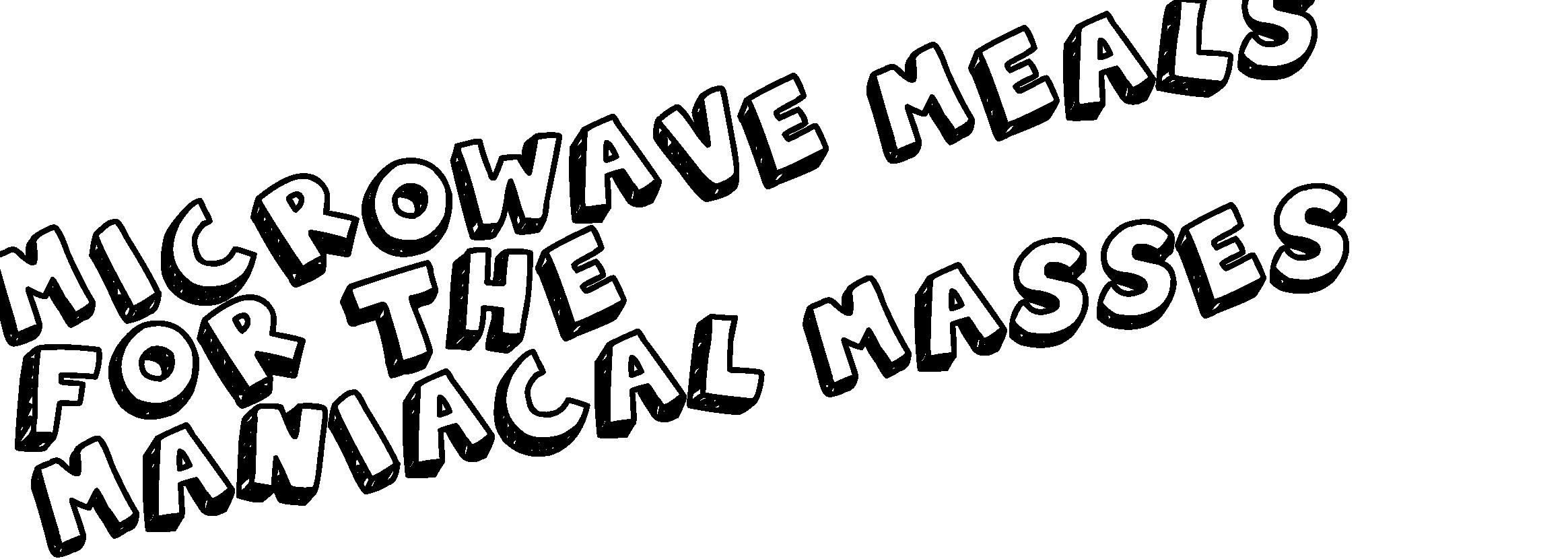
whisk–Iundertookamissiontomakeallofmymealsentirelyusing campus kitchenettes. My impetus here was not only to demonstrate the realpossibilityofsuchatask,butalsotohighlightforthelunchtimeLinkqueuerstheabundanceofmicrowavesallacrosscampus.Diditgiveme any time to study? Not really. Did it save money? Can’t say. Did the meals taste good? Perhaps – I’ll leave that to the roped-in reviewers to decide.

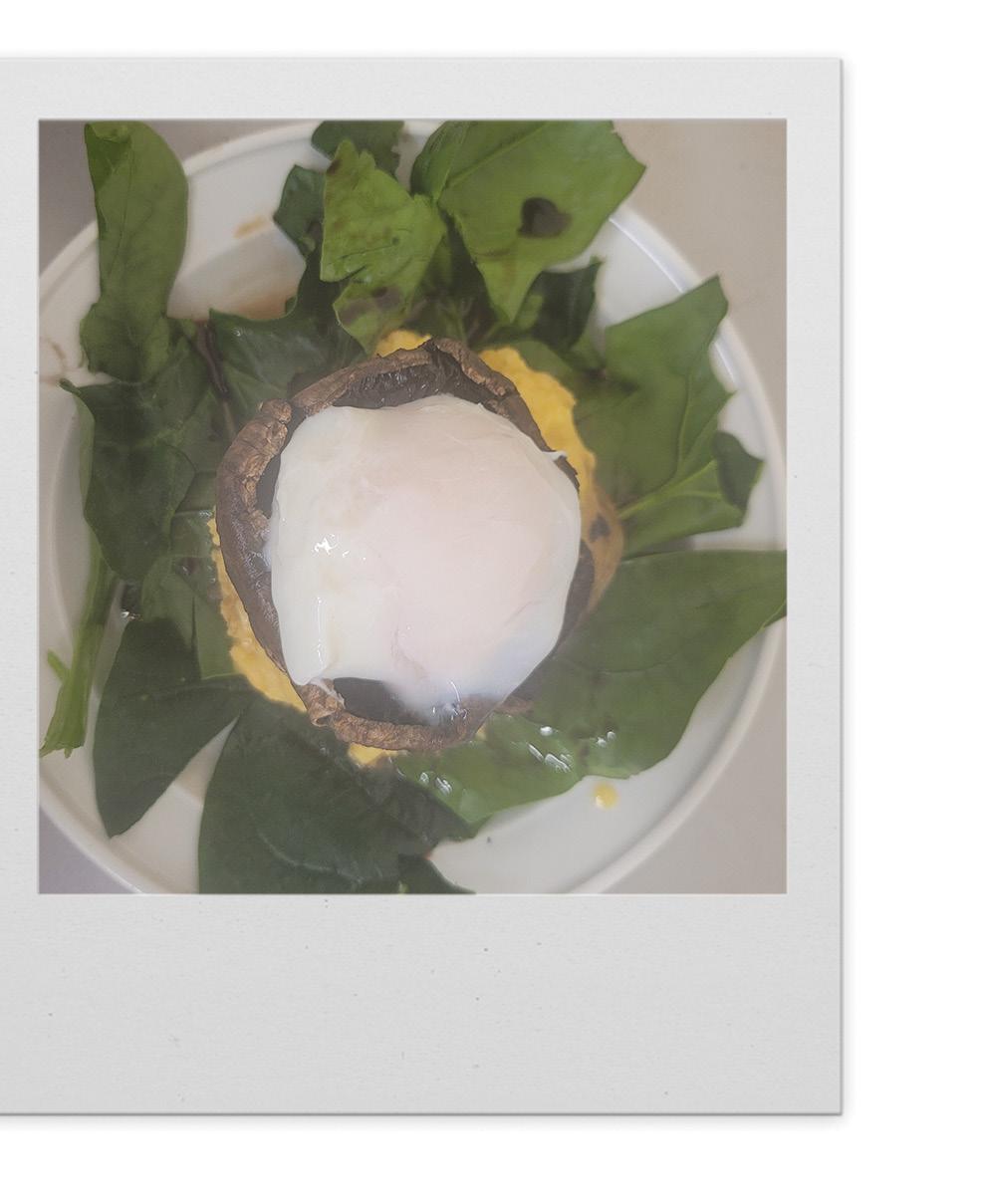
Step One: Churn butter by whisking 250mL cream until butter separates from the buttermilk (just try not to get flecks everywhere). Squeeze out the buttermilk using your hands or a cheesecloth, making sure to save it to be used later. Mold the butter into a ball and fold in salt to taste. Store bought works fine; what you lose on whimsy and price you will save on time.
Step Two: Slice potatoes into slices a few centimetres thick and then microwave them in Microwave 1 for ~12-16 minutes (until they go soft) with a bit of butter and some salt. For those who want a more traditional eggs benny (and aren’t coeliac), feel free to substitute this with toast or English muffins, though you will have to find one of the kitchenettes that actually have a
Eggs Benedict is a classic breakfast favoured by cafés that you, as a student, are probably not frequenting that often. Here, I aim to make this meal accessible to the masses through the most humble of cooking machines. The Burns’ kitchenette was perfect for this, with two microwaves and a boiling water tap – though I did have to explain myself to some baffled MFCO morning coffee makers.
Ingredients
Eggs (whole) x2
Egg (yolk) x1
Potato x1
Balsamic vinegar (2 tsps)
Brown sugar (1tsp)
Portobello mushrooms x2
Salt & Pepper
Baby -Creamspinach (one bottle)
-Lemon (one half)
Step Three: butter. Separate one yolk from one egg (save the white for the meringue later), whisk the egg with the lemon juice before gradually adding the stillwarm melted butter.
Step Four: When the potatoes are nearly done, whisk together 2 tsp balsamic vinegar and 2 tsp brown sugar. Spread that over the gills of the mushrooms and place them in Microwave 2 until the mushrooms are juicy but still firm (~2-6 minutes).
Step Five: After the potatoes have finished, put boiling water, vinegar, and salt in a bowl. Crack the remaining eggs into the boiling water and then microwave eggs for ~30 second increments until they look done (look for solid egg white all the way through). This step is the most variable depending on the microwave; my one at home took about 2 minutes, but the one in Burns took a fair bit longer.
Step Six: Melt butter in Microwave 2 and leave to cool till just above lukewarm. Separate yolk from egg (save the white for later), whisk the egg with lemon and a pinch of salt. Slowly add the butter to the mix while whisking continuously until the hollandaise has emulsified.
To Serve: Plate spinach on the base topped with a spoonful of hollandaise sauce, place the potato slices on the top of the hollandaise in two stacks. Place one mushroom on top of each stack, removing the stalk. Place a poached egg in the centre of each mushroom, sprinkle with salt. Enjoy!
Review: 7/10 – Overall the Eggs Benedict tasted “pretty good” which I’ll take, given the reviewer noted that they don’t like mushrooms or runny things. One thing that didn’t go as well as it could have was the egg, which was a bit runnier than ideal. I put this down to the microwave being slightly weaker than my one at home, so definitely would improve with practice.



Ingredients
Lentils (2/3 cup)
Paprika
Curry Powder
Tomato x1

Hoping to curry favour from the Law students, I made my dahl in Richardson which has some great microwaves available on most floors. Unfortunately, each kitchenette only has room for a single microwave, which meant I had to use the advanced technique of multi-floor cooking.
Recipe
Chilli flakes
Butter (– cup)
Buttermilk (from earlier) - ~2/3 cup
Self Raising flour (gluten (optional))free~1/2 cup
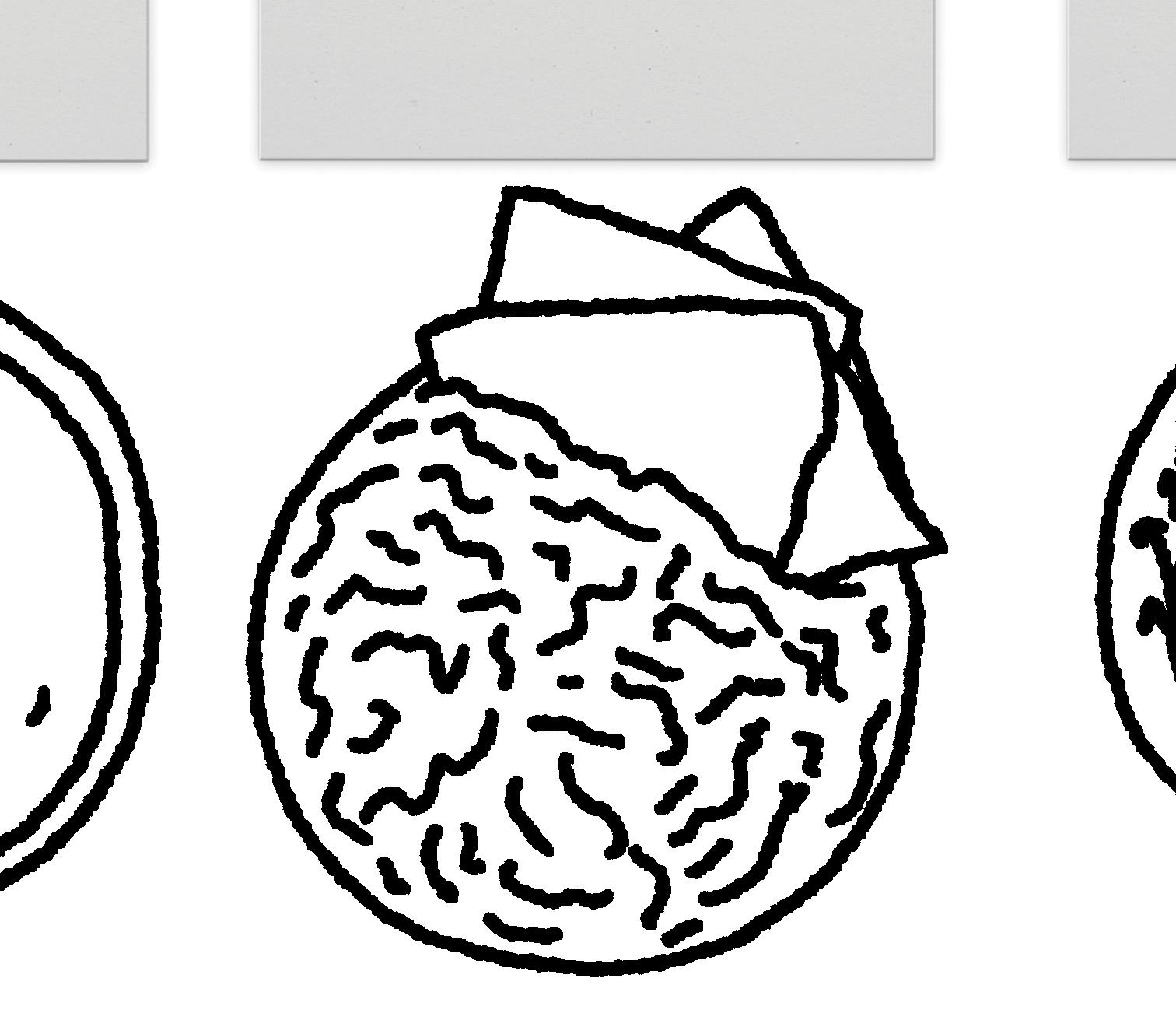
Step One: Wash ~1 cup of rice in a sink and then top up so that the rice and water have a 1:2 ratio. Cook in Microwave 1 for ~10 minutes.
Step Two: Combine ~½ cup of lentils with ~½ cup of water and then cook in Microwave 2 for ~10 minutes. If you really want to, here’s where you’d pretend to do something productive like start that reading you’ve been procrastinating.
Step Three: Once the rice has finished cooking, melt ~¼ cup of butter along with spices to taste (I used curry powder, salt, and chilli flakes) for ~ 2 minutes in Microwave 1. Stir in with the lentils.
Step Four: Add the buttermilk that you saved earlier to self-raising flour until a thick soupy texture is reached. Cook in Microwave 2 for ~ 7 minutes or until breadlike in texture (you may need to flip the bread over and cook for another minute or two).
To Serve: Plate rice and then dahl, with bread on the side.
Review: 8/10 – I did assume that this would be the most likely meal to work and I was pleasantly affirmed. This dahl was both “fire” and “slay” and compared favourably to the $4 lunch dahl (which, if my maths is right, it is cheaper than per portion).
Lit by the hellish overhead white lighting of the Link, time seemed to stretch and blur. I felt like I was in a haze (not helped by the multifloor cooking dizziness from lunch). The space was immensely public. The chairs were the least comfortable in the world. I genuinely experienced some kind of microwave-induced Havana syndrome. This is a recipe not for a meal, but for an out of body experience.
Ingredients
Milk
Vinegar
Step One: Pour milk into a bowl, adding about a teaspoon of vinegar and a pinch of salt. This will theoretically become cheese later.
Step Two: Knead the eggs into the flour until it forms a firm ball. Flatten out the dough and try your hardest to cut it into long strips while despairing as it fails to do this and instead manages to both dry out too fast and clump together. If you do this in the Link, here’s where you’ll be spending most of your time trying to avoid weird looks from other students.


Gluten Free flour ~1
1/2 cups
Eggs x2
Tomatoes x2
Garlic
Paprika
Italian Herbs
Sanity x-1
Step Three: Bring a bowl of water to boil and, having given up on making the pasta look at all presentable, put it in. Keep the water boiling by intermittently putting it into the microwave until al dente. Or don’t do this actually; just because something is possible doesn’t necessarily make it a good idea.
Step Four: While this is happening, mince garlic and tomato using a knife. Combine with herbs and spices to taste before microwaving for ~2 minutes.
Step Five: By now the cheese should be done. Separate the curds from the whey by squeezing it through a cheesecloth.
Step Six: Pour the water out from the pasta, making sure to rinse off the mucus- like layer that inexplicably formed on the surface? (No idea how that happened).
To Serve: Pasta on the bottom, sauce and cheese on top, microwave for another ~ 1 minute to melt the cheese a little. Try not to think too hard about the abomination you’ve created.
Review: 3/10 – The rating here is exceedingly charitable. I felt the need to warn my reviewers about how bad the meal was beforehand. Some stunning quotes included “has taste, not the cheese, but the pasta itself has taste”, “it is a solid substance”, and “the sauce isn’t really sauce, more like brutally mauled tomato”. One person reckoned that they had “eaten worse”, which is damning by faint praise.
After making the pasta, I genuinely don’t totally remember much of making this. I was meant to go to St. David’s for it, but instead I think I entered a fugue state from which dessert suddenly appeared. Whether this is necessary for the recipe to work is unclear.
Egg (white) x1
Self Raising flour ~ 1/2 cup

Step One:buttermilk in a bowl – like the bread, you’re aiming for a soupy thick texture – alongside brown sugar, cinnamon, and whatever holiday spices you have on hand (like cloves or something). Microwave for ~6 minutes till the the cake, then sprinkle with some more brown


6.5/10 – Unclear what direction having the pasta beforehand influenced the rating, could be that it was lowered by association or raised for its contrasting edibility. Testers noted the stewed apple as the real highlight of the dish – and this is definitely something that could be eaten just on its own.




We’ve all been there: standing in the checkout line, staring at your sad basket of instant noodles, cheap bread, and maybe some reduced to clear mince. When you’re down to your final $25 for the week and faced with the choice between a box or fresh veggies to get you through the weekend, most students opt to drown their sorrows.
Critic Te Ārohi’s 2025 Census found that nearly 79% of students ranked the cost of living among their top three concerns – an unsurprising figure given that almost half of New Zealanders nationwide report the same strain. A key component of the cost of living is the grocery basket – so it’s unfortunate New Zealand sports some of the highest grocery prices in the world. For students, these prices are particularly brutal, making even the basics feel out of reach. Between StudyLink payments and a part-time job, barely the rent and power bills are covered – let alone a healthy diet.
It doesn’t make much sense to the average Joe. New Zealand produces a shit tonne of food, but it still feels like meat is a luxury item. The fuck? The answer as to why your grocery shop breaks the bank is less about individual choice (buying a block of cheese shouldn’t make your chest ache with guilt) and more about structural failure (the economy needs Government intervention to make things better). Aotearoa has a supermarket market dominated by two main players – known as a duopoly – and a legal system that is currently unable to fix the issue.
No Dumb Questions: What Do Students Know About The Duopoly? For most students in Aotearoa, groceries are less about nutrition or enjoyment and more about survival. Students that Critic spoke to reckoned their weekly food budgets typically fell between $50 and $110 – numbers which may sound manageable until you realise how little that covers. These days, a block of cheese can reach upwards of $16. Eggs are coming in at around $10 a dozen. Cucumbers are like $6 despite mostly consisting of water. When surveying students on why groceries are so expensive in New Zealand, there were some pretty obvious answers: “inflation,” “capitalism,” and “the government.” Others offered more personal takes: a sense that “everything is just harder now,” or that it’s something to do with“Covid” and that “increased production costs had driven prices up.”
Instead of baking chocolate chip cookies, fifth-year Law student Reagan* has applied those brains of his to create “recession cakes and muffins” made from oil, milk, and sugar. His friend Yasmin* is well-acquainted with Reagan’s creations: “The other day I ate a real muffin, and I was blown away by the fact that it didn’t taste slightly of oil [...] I’ve been duped into thinking that every dessert should taste faintly of oil.” Euanm, a third-year Anthropology student, has stopped buying bread altogether, occasionally making it from scratch, and Reagan has cut out alcohol completely. “I’ve stopped drinking – alcohol is so expensive,” he says. Claire agrees: “$30 a week savings really makes a difference.”
Financial pressure even hangs over student’s social lives. Claire admitted to dreading a BYO she had that night, with the group estimating that once drinks, corkage, and food are accounted for, a single night can cost upwards of $50 – “which is how much Wax Mustang was charging for a ticket in
Wanaka.” It creates a sort of student-buyer's remorse, leaving students feeling “angry, guilty, and frustrated”. Sophie*, a fourth-year Law student, told Critic that she often feels “haunted” by “bad spending decisions”. Nowadays, she simply accepts that she won’t “get joy out of food”. But if students are regularly feeling “angry, guilty, and frustrated” due to celebrating a mate’s birthday or buying a block of butter, you have to ask: what’s going on?
Some (law) students Critic spoke to noted that Aotearoa’s small population and relative isolation makes us a less lucrative market for multinational companies. “We have a low population, so there’s less people and less buying power [...] It doesn’t make a good lucrative market for multinational companies to come in.” Others linked high domestic prices to export dynamics: “I think because we are such an export-dependent country [...] a lot of our prices are built on this idea of global demand [...] because we export, we can charge more here.” Competition (or lack thereof) was also a recurring theme. “Obviously we have low competition in the [grocery] sector.” A few students also pointed to “not enough government regulation” as a factor. Other students happily admitted, “Actually, I haven’t really thought about it.”
It might seem a bit of a jump, but the answer as to why Reagan and Yasmin have resorted to Depression-era baking and ditching the drinks is, at least in part, due to the duopoly. Probably also due to rogue student ingenuity. Many of the students Critic talked to staunchly rejected the idea that individual hacks could fix the underlying cost of living crisis – and they’re right. The grocery market is structurally screwed.
New Zealand’s grocery market is dominated by just two players – Foodstuffs (New World, Pak’nSave, Four Square) and Woolworths (Countdown). Technically, it’s three players – Foodstuffs has a North and South ‘branch’, but for the consumer it pretty much looks the same. Together, Foodstuffs and Woolworths operate as a duopoly that make up 82% of our grocery sector: two market players that hold significant market power. This is important because it can impact market competition, a concept used to describe the way market players compete with each other for consumers, using factors such as price and quality.
When students were asked if they knew what a duopoly was, responses were mixed. Some nailed it: “It’s two companies controlling everything” or “two main companies that owned everything.” Some went full Monopoly mode: “I know a monopoly is one person controlling everything, so I guess a duopoly must be two people controlling everything?” The law nerds
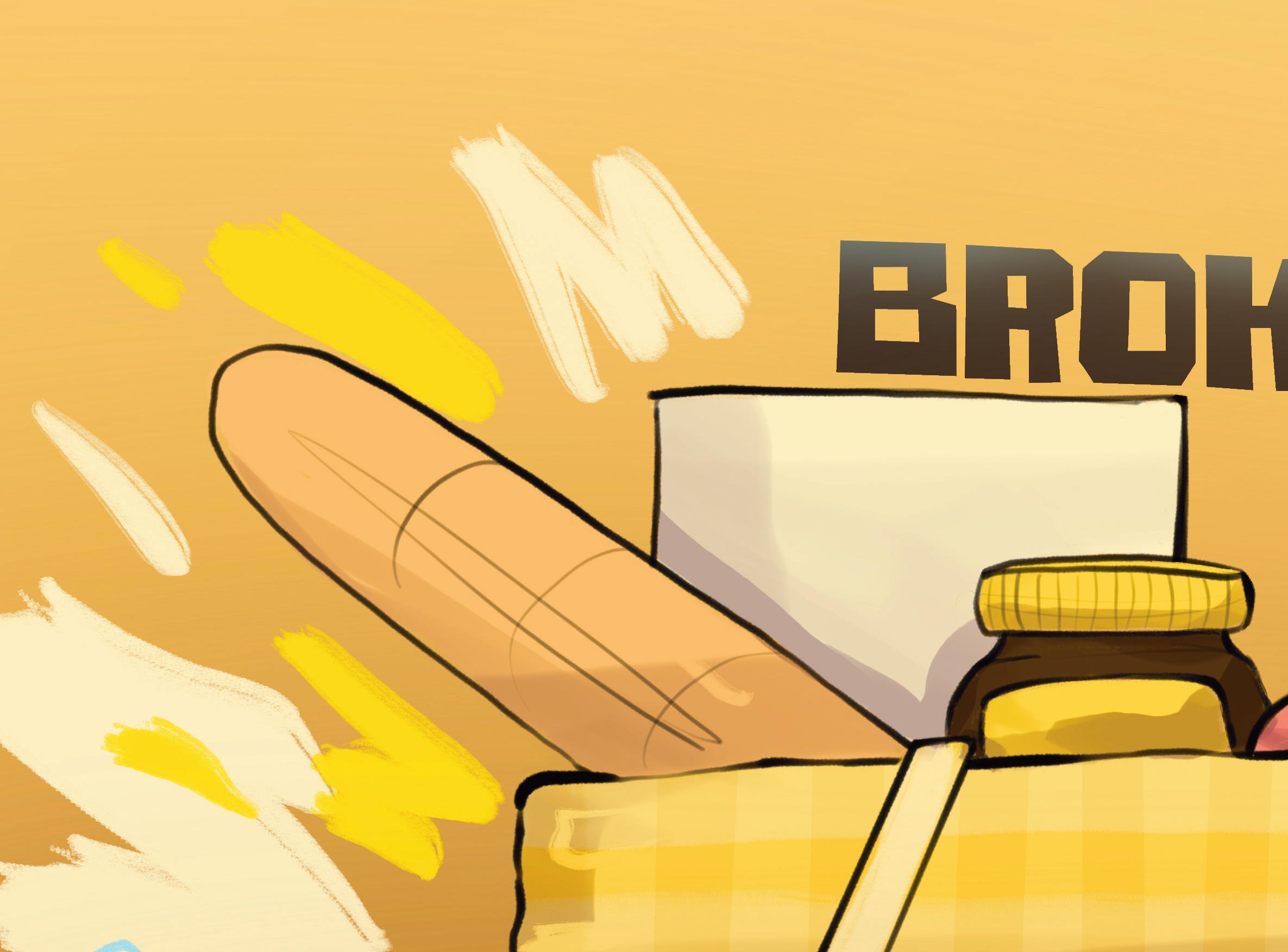
By
interviewed made reference to these structural forces: “There is an illusion of competition […] Four Square and Woolworths are owned by the same company,” “they’re not incentivised to compete with each other.” Others had no idea: “Not sure aye.”
Let’s break down the duopoly. Chances are, you’ve heard of the game Monopoly. If for some reason you’ve just crawled out of the womb (good luck) or left the place under the rock you call home, players win at Monopoly by becoming monopolists and getting all of the good properties on the board. It’s fun being a monopolist because you get heaps of money. However, it’s not very fun for anyone else – the monopolist can charge however much they like because they have lots of bargaining and market power. There is no competition for consumers to benefit from, as they must instead pay the price the monopolist sets.
Thankfully, a close eye is kept on many monopolies in New Zealand. For example, Transpower owns and operates the national electricity grid –they are a monopolist. Imagine how bad it would be if Transpower decided to misuse their market power by charging ridiculous prices, which would be a massive burden on consumers who are now faced with extremely expensive power. As such, the Commerce Commission and Electricity Authority make sure Transpower is transparent about how they charge consumers and what they are allowed to earn on investments.
Similar to the monopolist, a duopolist (where there are two dominant market players) can also maintain high prices and limit competition. This is because two market players rarely vigorously compete with each other. Think of it this way: if you and your mate are both 50/50 owners of the Monopoly board, you can both earn a fair amount of money if you just leave each other alone and both charge high prices. Sure, you’re not earning as much as you could as if you were a monopolist, but monopolists tend to get regulated and attract more public scrutiny. Duopolies are the place to be!
Competition law is meant to prevent duopolies and monopolies (more broadly known as ‘market concentration’) from harming consumers. According to Ed Willis, a competition law expert and lecturer here at Ōtākou Whakaihu Waka, competition law can generally be defined as “boundaries” that are set in place to ensure that free market exchanges benefit consumers. It allows businesses to discover, and consumers to decide, where the best price quality trade is for any good or service – “as long as the market is working properly”. To achieve this end, competition law broadly prohibits three key things. Firstly, the misuse of market power: certain conduct for businesses that yield large market power is off limits.
Secondly, if you don’t have market power we don’t really want people to get it, so competition law prohibits increasing market power through buying up competitors. Thirdly, collusion is a no-no (like price-fixing cartels). However, in practice, these mechanisms are not currently strong enough to constrain New Zealand’s supermarket duopoly.
Ed’s key stipulations for how competition law effectively functions were “as long as the market is working properly”. However, in a nutshell, the grocery market is not working properly – and this is why consumers suffer. “Competition law gets [interested in the grocery sector] because supermarkets have market power,” Ed explains, referencing their duopolist status. As a result, Ed says that supermarkets wield market power in two directions: over consumers and over suppliers. Bear with us through the jargon – understanding how supermarkets constrain consumer and supplier choice directly illustrates why we’re struggling to keep costs down.
In the ‘consumer direction’, individual supermarket stores essentially operate as local monopolies. Long story short, supermarkets know that consumers will only do so much to save a buck. While I could drive to South Dunedin to visit Pak’n’Save, the Mad Butcher, and then hit Veggies Boys on the way home to get a pretty cheap shop, I won’t. I’ll probably just hit my local New World. According to Ed, supermarkets leverage this by tending to only compete with other stores within a five-kilometre radius, as this is about the radius consumers will travel for their weekly shop. Not sure if you’ve noticed, but supermarkets aren’t often in super close proximity – they all tend to abide by that approximate five-kilometer ‘rule’.
Additionally, over the past two decades, supermarkets have strategically purchased large plots of land and imposed restrictive covenants on that land before onselling to prevent competitors from building nearby. These covenants are now outlawed, but it’s potentially too little and too late. The result is that for many consumers, their local supermarket is their ‘only’ option, giving that store pricing power without fear of losing customers. Supermarkets basically have a captive consumer group that they can act as a local monopolist in.
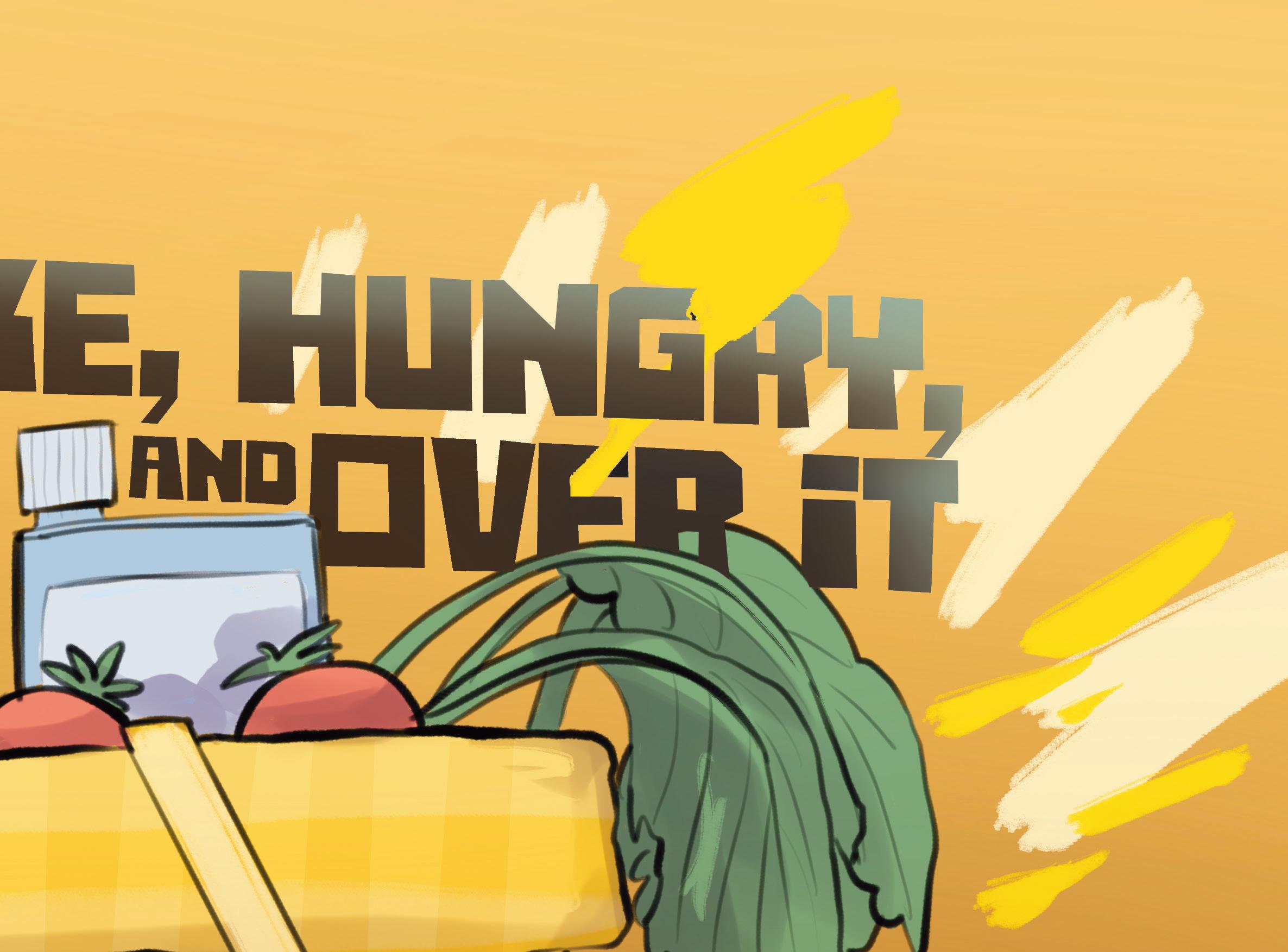
Supermarkets also dominate their suppliers. Most of New Zealand’s grocery suppliers are small, family-owned businesses. They have extremely limited options for selling their products and must negotiate with Foodstuffs North, Foodstuffs South, and Woolworths to survive. If suppliers don’t like the prices those supermarkets give them, then they’ll have fun going out of business. This power imbalance allows supermarkets to demand wholesale prices while selling to consumers at a significant markup, pocketing the difference. Ed notes that this dual monopoly – over consumers and suppliers – is a major reason why food prices remain high.
Alice Taylor, former scarfie and Critic food columnist turned professional food creator, doesn’t need a law degree or economic jargon to explain the dire cost of living crisis. Alice just has to walk into New World. “The vibes are awful. Everyone’s pissed off.”
Some of the students Critic spoke to regarding the duopoly reiterated what Alice had sensed while on her weekly shop. Reagan described the student population as “a society of people yearning to be set free of high prices.” Marcus* said he often stares longingly at fresh vegetables he can’t afford. Sophie* admits she lingers in front of the butter section “just looking sad.” Even Pak’nSAVE, usually seen as the cheapest option, is out of reach for those without cars. However, alongside the hardship is a unique sense of solidarity. Every student knows what we’re talking about: “Everyone else is going through it too.”
Alice’s Instagram page (@alicetayloreats) has amassed over 300,000 followers. Her success is something she feels is, in part, a reflection of that collective frustration many of us feel at the supermarket. “Pages like mine have grown astronomically because that’s what the climate is wanting,” Alice explains. Alice’s content blends everything from cheap eating hacks to conversations with politicians about why your block of cheese costs $16. Christopher Luxon, Chlöe Swarbrick, Nicola Willis, and Chris Hipkins have all sat in Alice’s kitchen, discussing the current crisis and showing that cheap recipes and structural critique are part of the same conversation. The popularity of her videos – baking with substitutions, stretching cans of beans into dinners, leaning back into Depression-era recipes – signals how desperate people are for small ways to push back against high prices.
Before Alice had donned a MasterChef apron and had MPs sliding into her DMs, she was just another broke student trying to stretch her StudyLink payment into food that resembled a meal. In 2019, she was flatting for the first time, blowing her budget on restaurant dinners before quickly realising she had to learn to cook. “Being a student shaped the way I cook now,” she tells me. “You have to do it out of necessity – that’s where the creativity comes from.”
Alice came to Otago to study law (peer pressure, fuck Arana) before switching to politics and history. She launched @alicetayloreats in her second year, gaining around 1,000 followers. Given this was during 2019 in Dunedin, this was pretty much minor celebrity status. She wanted a food column, having always wanted to be a food writer, so she pitched herself to Critic. While she had little experience, she could promise on-time deadlines and no pay required – the kind of sweet nothings that still work on Critic editors today.
That initial pitch turned into her iconic Fuck, I Can’t Cook series, a rogue ode to student cooking where she shared weekly recipes. “People loved it,” she recalls, “I’d go to flat parties and see my recipes stuck up on walls.” Much of the Fuck, I Can’t Cook series is still up on the Critic website today, so definitely check it out.
From there, Alice auditioned for MasterChef. One of the first things the judges commented on in response to her audition meal was her use of “normal ingredients” in cooking. Seems she’s always been down to Earth like that. Alice made it as a finalist and then trained as a chef, sweating through finedining shifts before pivoting back to the kind of cooking she loved. But leaving MasterChef came with its own pressure about the visuals of food content on Instagram: “I was constantly confronted with recipes and visuals: how a person looks, what kitchen they are cooking in [...] I was often leaving the app feeling worse about myself and my situation.”
Alice eventually reached a breaking point. “Either I’m going to post realistic food, or I’m not going to post anything at all,” she said. The decision became the very foundation and ethos of her page. “I wanted to create a page where people could get value in that they learned something, but also that they feel better about themselves after they go on it.” Alice has built her current career around empowering regular Kiwis to cook realistic, affordable, and unpretentious food. Part of this is showing her mistakes. “As a rule, I always include the fuckups that I make in the recipes.”
When asked to comment on her tips for students struggling to eat healthily in this cost-of-living crisis, Alice stressed the importance of shopping seasonally – of really trying to understand what is in season, and therefore cheap, and basing meals around this. She also stresses the importance of keeping an open-mind when going shopping. Keep the staples: pasta, tinned whatever, but then remain flexible with the fruit and vegetable options. Frozen produce is both economical and nutritious, and choosing the right store makes a difference. Stop paying $6 a capsicum when you can get a kilogram of it frozen for the same price. She reminisces and speaks highly of well-priced Veggie Boys, which Critic reassured her was still very much a staple for Otago students.
As it stands, students are doing the best they can with the economic circumstances they are facing. Alice is quick to acknowledge that the economy was vastly different when she was in her first couple of years at Otago. “I would imagine the financial pressures on you are much worse than they were on us,” she says.
Alice’s background in politics has shaped the way that she thinks about food “enormously”. After completing a Master of Politics at Otago, she nearly pursued a PhD on the politics of food – a proposal she admits went nowhere, but one that captured her frustration. Her studies focused on Taiwanese, Chinese, and U.S. foreign policy and security, disciplines that forced her to think critically across ideological divides. “I am fascinated by politics and talking to people and politicians with different views to me [...] I just want to understand why they think the way they do.” That openness, she says, has sharpened her approach to food politics: analysing issues with curiosity, resisting easy binaries, and reflecting a range of perspectives back to her audience.
Based on her Instagram interviews with various politicians, Alice has found one point of consensus across Aotearoa’s political spectrum. Every politician she’s spoken to has admitted to the severity of the current supermarket situation, and most pointed to more competition as the fix. Alice felt that these conversations were necessary to the kind of content she was posting. For her, it felt weird saying to her audience, “Hey guys, here’s how you save money”, without addressing the elephant in the room. “This cost-of-living crisis is out of our control. It’s not about buying the right cut of meat. It’s about the economy improving. It should not be this expensive for people to feed themselves.”
Alice stresses that she doesn’t want Kiwis to just accept that food is expensive here, the same way we have been told to accept being a lowwage economy. Her platform allows thousands of students, young families, and everyday Kiwis to comment directly on political soundbites – a kind of digital accountability forum. “Politicians read those comments, and I felt like I brought people and their voices closer to politicians.” She wants to reflect back what the politicians are thinking to her followers so that they can engage in some kind of dialogue about the cost of living crisis.
For all the talk of “more competition”, the current economic playing field is tilted pretty heavily in favour of the current duopoly. As Ed Willis explains, the duopoly is propped up not only by sheer size but by these tactics that make it nearly impossible for new players to break through.
The supermarkets are not necessarily acting out of malice; they are simply behaving rationally within a duopolistic structure that rewards soft competition. “Two big supermarkets is not enough to exert competitive pressure on one another,” Ed says. “It’s much easier for them to compete very softly with each other than act competitively.” While this might sound a bit like collusion, it’s done passively – “they’ve just worked out that if [they] don’t compete aggressively, it’s kind of good for [them].”
Rather than battling aggressively for customers, the two giants appear to have reached a quiet understanding: restraint benefits them both. Genuine price wars would eat into their profits, so instead, they maintain high base prices, punctuated by periodic ‘specials’ designed to create the illusion of competition. For consumers, that means little real choice. You cannot walk into a supermarket and negotiate your bill. You pay what is on the shelf. As Ed puts it, “It’s easy being a monopolist. You set the price high, and people still buy because they have no alternative.”
Attempts by other players to enter the market have largely failed. The Warehouse, for example, experimented with selling groceries cheaply to attract customers, planning to make a profit from other products in-store. However, the entrenched supply chains, nationwide distribution networks, and deep margins of the duopoly meant that the Warehouse could not sustain competition. Even international giants like Costco face formidable barriers: entering New Zealand would require replicating the duopoly’s complex infrastructure (think warehouses, supplier agreements, refrigerated trucks) or relying on government subsidies, neither of which is guaranteed.
The Commerce Commission, competition law’s key regulator, has recognised these issues. Its 2022 market study into retail grocery highlighted a “serious lack of competition” and recommended aggressive interventions, including wholesale access schemes or introducing a third player to disrupt the duopoly. Yet government action has been limited, often constrained by political risk and the economic clout of the existing supermarkets.
So what could change? Politicians float ideas like forcing the duopoly to structurally separate, or setting up a ‘Kiwishop’ (think Kiwibank but for
groceries). Ed emphasises that, while competition law theoretically prohibits misuse of market power, simply charging high prices is not illegal. Structural solutions – like Kiwishop, third-player entry, or splitting the duopoly – lie beyond the reach of competition law and remain politically contentious. The Grocery Commissioner, appointed in 2023, is meant to monitor unfair practices and push supermarkets into fairer dealings with suppliers. Ed is sceptical about whether these measures have “teeth” or not. Regulation always sounds good in principle, but if it is not enforced vigorously, the incentives for supermarkets to behave differently are weak.
What Nicola Willis’ Recent Proposal Would Mean For The Duopoly If you’re particularly onto it, you may have noticed Nicole Willis hooting and hollering in the media about her big plans to fix the duopoly. Let’s quickly break down what these suggestions could mean for the supermarket sector.
Earlier in March this year, the Government basically put out the feelers and asked for investors and potential grocery market competitors to explain what was stopping them from giving Woolworths and Foodstuffs a run for their money. From the responses received, the Government got some “key themes” to work with. Long story short, consenting timeframes, limited access to suitable sites for new supermarket development (thanks, restrictive covenants), and accessing wholesale, competitively priced suppliers is difficult. These are known in competition law terms as barriers to entry.
From this, the Government has proposed creating a fast-track approvals process under the Fast Track Act for supermarkets, as it currently takes about 18 months and $1 million to get resource consent. Expenny. But think about supermarkets: they kind of all look the same. Aisles, butchery, fresh produce… You know the drill. It’s a pretty intensive process to get consent considering the buildings are more or less the same.
It’s weird that it would take that long for councils to essentially approve the same building copy and pasted in different spots. The Government thinks so too – so is allowing grocery developers to use the MultiProof scheme for faster building consent. MultiProof is a national approval that allows builders and companies who make the same or similar standardized building designs to streamline their consent process. Building consent is still required with MultiProof, but basically only examines site-specific features (like foundations) and needs to be completed within 10 working days instead of 20. It’s kind of like having to get a separate approval every time you print the same document on a different printer. Even though it’s the exact same file, you’re still stuck waiting for someone to check it over each time. The MultiProof scheme is like getting that file officially pre-approved, so now all you need is a quick check to make sure the paper tray is loaded properly – and you're good to go.
Removing restrictions to MultiProof is quite good for all grocery developers, not just new entrants. Therefore, it might not do anything specific to break up the clear structural issues within our grocery sector. According to an opinion piece published by The Spinoff, right-wing thinktank New Zealand Initiative (NZI) is claiming credit for the idea. NZI’s board members include
Plus, what’s the point in a speedy consenting process if our wholesale sector is still fucked. Without access to competitively priced wholesale groceries, entrants wouldn’t even have groceries to sell. According to Willis, “A cost-benefit analysis of restructuring the major grocery players is underway,” and the fast-track process forms part of some pro-competition grand scheme. While amendments to the Fast-Track Act to incorporate the streamlined grocery-development process will be done by the end of the year, Willis also proposed some other changes that would shake up competition, but are left undated. Firstly, she promises to “improve the operation of the Overseas Investment Act regime by clarifying the pathways available for grocery investments.” This would be massive to get international players such as Lidl and Aldi interested in our grocery market.
She also proposed to amend the Commerce Act (our key piece of competition law) to better combat “predatory pricing”. Predatory pricing happens when big market players misuse their market power to sustain often artificially low prices in order to stamp-out new entrants. For example, if you have 9/10 properties on the Monopoly board, you could force the last property holder out of business by undercutting them and charging low prices for players to stay at your properties. You can afford to take the temporary hit until the competitor is out – you ‘starve’ them out of the market. This is prohibited under section 36 of the Commerce Act (misuse of market power) but the Commerce Commission has only taken action under that section once since its reform in 2020. Willis intends to introduce an “objective economic test” to test whether predatory pricing has happened, but she didn’t expand on what exactly that test could be.
While it’s difficult to comment without seeing the legislative or policy detail, Ed thinks the potential of an objective test is probably a "positive thing”, given it’s a direct acknowledgement from the Government that supermarkets do have market power that can be misused “to frustrate entry or expansion.” An objective test could (if calibrated right) remove some of the debate over whether pricing is predatory or not – but this will still be “difficult to prosecute.”
“Say the objective standard is pricing below cost,” Ed suggests. The issue with this is that supermarkets and other businesses do this all the time: headline items are often reduced to below cost as a marketing tactic. “Is this no longer allowed?” Ed asks. “If evidence of an anti-competitive intention is needed, how will this be proved? Do we need a smoking gun email that probably doesn’t exist?” Finally, how do you explain to consumers that the lower prices they enjoy are actually harming competition and need to be removed. “It would be a brave government,” Ed says.
Aotearoa is left in a bit of an uncertain place. Without structural intervention, Ed predicts little change – something he thinks is “years away”. The worst-case scenario is less choice, because suppliers will suffer and go out of business. The grocery sector remains at a crossroads. Students should not have to choose between fresh vegetables and paying rent, yet in a market dominated by two supermarket giants, that is the current reality.


More people than ever are recording what’s going on at gigs. But where do these videos go after the show? Maybe someone will post a few seconds onto their Instagram story, but once it expires, it’s gone. Fraser Thompson understands the danger that “lots of important and valuable things are just lost in time,” and is doing something to combat this.
Fraser has developed an online library of media from musicians playing live in Dunedin. His goal is to record a wide variety of live music and present it in a way that people can access for years to come. Fraser invited Critic to join him for a drink at his home turf, Woof Bar, before explaining, “You never know what could be interesting in five or ten years to have recorded.”
Fraser began this journey casually in 2014 while studying Computer Science with a minor in Music at Otago Uni. He wanted to record his friends playing at Re:Fuel’s (now U-Bar’s) open mic nights.
To capture audio discreetly, Fraser purchased two tiny microphones and embedded them into a pair of ear plugs. This way, he doesn't take anybody out of the moment. This concept plays with the idea of binaural recording where you record with microphones in the position of your eardrums to give a more realistic sonic experience to listeners. Fraser adds that he tries “to cut out conversations if I have them.” He’s just gotta be careful not to sing along when ‘Mr. Brightside’ plays – that would be his street cred down the drain.
Posting to his own website’s growing archives rather than on the ‘gram, Fraser says, “I wish more people just made things for the internet.” He’s happy to utilise the breadth of the internet outside of the restrictions of confining social media apps. Navigating through his website feels like a blast to the past, not just because of its deep archive of gigs but its retro interface.
Fraser doesn't earn any money through his endeavors. He tells Critic that he doesn't “want to take anything from the music community.” He works full time as a web developer so dunedinsound.com is “basically a hobby that’s just funded by a job.” Fraser claims that the best perks he’s received is getting in on the door for free with the reputation he’s built in the local scene.
At the peak of Fraser's recording spree he would go to more than two gigs a week. Fraser reflected that this lifestyle wasn’t super healthy: “I was forcing myself.” He told Critic that there was a point where he considered stopping, under the mindset that it was “all or nothing.” But instead decided to continue on, albeit taking things a bit slower.
For Fraser, this project is a labour of love. Critic asked him when the last time he went to a gig without recording it was. A bit shocked by the question, Fraser said that he “can't remember any other different way of going to a gig.” He paused, “Maybe I should go to some gigs without a camera, see what it's like.”
In terms of future proofing the archive, Fraser says that keeping the website online costs 10 dollars a month. Wanting to keep it running for as long as possible he jokes, “Hopefully I'll never get into a position where I can't afford $10 a month.” In terms of adding new content Fraser says, “I don't see myself stopping any time soon, as long as I'm in Dunedin, which I have no plans of leaving.”
Take a geeze at dunedinsound.com for an unbeatable study break.

ByJonathanMcCabe


BY JOAN OF RARK
They finally did it. The company who could at this point trademark the term “lolly water” have circled back to the original lolly water: Cola.
Whilst this stuff is not their first dabble into cola flavours, with cherry cola and vanilla cola being other flavour options, it took them this fucking long to make literally vodka and coke – which would probably be what you’d get if you ordered Fisher-Price’s ‘baby’s first mixed drink.’ That being said, the actual drink tastes kind of strange.
The opening notes of this bev convince you it’s a Bourbon and cola, but it never quite hits that woodiness, leaving your tongue a bit confused as to where the fuck the rest of the flavour is. It should be noted that I opted for the 7% canned version, and not the 4.8% bottle, as they are a dollar more for like 8 more standards (holy sunk-cost fallacy).
Vodka and coke are a strange mix. In mixed drinks, coke is often accompanied by a spirit with some kind of actual flavour – be it Bourbon, whiskey, or fuck, even red wine. The lack of any meaningful spirit taste here is kinda like dying last in a horror movie – all that work for nothing.
It’s one of those drinks that just ends up tasting like a watered down and less carbonated version of the mixer. It’s the right beverage to smash back 12 then roll through town, except for
maybe the fuck-you level headache you are gonna have in the morning. Any experienced drinker (cos you aren’t an alcoholic till you get your degree) will be familiar with the Cruiser hangover, though (especially the lime ones on St Paddy’s).
Tasting notes: Half-flat homebrand cokes
Scullability: Solid 7/10, funnels would go stupid
Pairs well with: ‘Call Me Maybe’ by Carly Rae Jepsen, being four deep on a E-scooter with a seat
Hangover: DEFCON 1

When shopping seasonally during winter, fresh tomatoes are generally off the menu at my house. Sadly, no tomatoes means no tomato soup during soup season. Thankfully this year I have found a workaround: canned tomatoes! They taste the same once roasted, are cheap as, and available year round. Send off winter with one last soup and thank me later ;)
Note: You will need a stick blender/blender/nutriblender of some description for this recipe.
3 x 400g tins whole tomato (crucial to get the whole tomatoes so they roast up properly!)
Step 1. Preheat your oven to 180°C.
Step 2. Take a large roasting dish/ tray and add the chopped onions, carrots, celery, thyme, and canned tomatoes – juice and all!
Step 3. Add in about 2 Tbsp of oil, some salt and pepper and toss until everything is covered.
Step 4. Place into the oven for 1 hour, tossing approx. every 20 mins.
Step 5. After 1 hour, take one of the carrot pieces, if you can easily break it in half with a wooden spoon the vegetables are done. If there is still a bite to the carrot, place back into the oven for another 20 mins until cooked.
Step 6. Transfer the roasted vegetables to a large pot. Let them cool for a couple of minutes and blend until smooth.
Step 7. Turn the pot on to a low heat, stir in the sour cream until combined, and then stir through the vegetable stock.
Step 8. If it is still lumpy, go through carefully with a stick blender one more time.
Step 9. Cook on a low heat for an additional 10 mins, stirring occasionally, until hot all the way through and bubbling slightly.
Enjoy hot and serve with a side of crusty bread!
By Ruby Hudson

By Molly Liddell &
It's winter in Dunedin (spring technically begins on September 21) which means two things: the wind hurts your face and your power bill could bankrupt a small nation. Yet somehow there is always that flatmate, the one who decides the flat's already freezing lounge needs a "fresh breeze". A breeze? It's August, mate. You're not “freshening” the air, you're just tossing our heat out the window.
Opening windows in winter should be banned, flat out. Firstly, Dunedin flats are essentially giant refrigerators with couches. The insulation is a joke and the power bill is higher than your student loan repayments will ever be. Opening a window in August doesn't bring "fresh air", it brings financial ruin. Every icy gust pouring in is another $10 on the flat’s power bill, which means another week of eating Weet-Bix for dinner.
Then there's the health argument. You might think you're "invigorated" by that icy air, but the rest of us are quietly developing pneumonia. Students are already one bad sleep away from immune system collapse; throw in a constant draft, and suddenly half the flat is coughing through lectures. Cheers for that.
And let's not pretend it's about this so-called "freshness". The air outside in the middle of winter smells like damp socks, cigarette butts, and the crusty remnants of Speight's cans rolling around the flat steps. If you want freshness, buy an air freshener. Or, radical idea, clean your room.
It's also just rude. Shared flats are already a pressure cooker of clashing habits: who does dishes, who buys toilet paper, who steals whose oat milk. Adding "who turned the lounge into Antarctica" to the list? No thanks. A blanket ban on winter window-opening would save money, health, and
friendships. So no, opening the window in winter isn't quirky or wholesome. It's selfish. And until Dunedin flats get actual insulation and free heating (so, never), the windows should stay firmly shut.
What’s worse than a freezing flat? A freezing flat that stinks and keeps you sicker for longer. Airing out your flat is a necessary chore that needs to be done year ‘round, not just during the warmer months. Shared flats might be a “pressure cooker of clashing habits”, but turning it into just a straight up pressure cooker by keeping all the air in is not going to make that any easier.


Yeah, your flat might be a little bit colder for a short amount of time, but you know what’s worse than a cold flat? A cold flat that is full of condensation – which comes from your gross sweat, btw. Claiming that you shouldn’t open the windows because of the cold is like saying you shouldn’t vacuum your grotty dust- and crumb-filled carpet because of the noise. Just like your carpet, the air gets filled with all sorts of pollutants and odours that need to be expelled every so often. Any inconvenience is fleeting and the rewards are many. Besides, have you ever tried getting over a cough in a damp flat?
Genuinely impossible. Winter is when you’re gonna be playing Russian roulette with the Re:O-Week resurgence of fresher flu and keeping your flat dry might just be what helps your flatmates get better before they infect you, or – if you’re unfortunate enough to get sick – it might be what makes the difference between a week of skipping lectures, and having to reinvent tuberculosis chic to cover for your months-long bedridden bout of bronchitis. Not to mention, healthier flatmates are more agreeable flatmates, so keeping the air dry is a must for both mental and physical health.
This doesn’t mean you have to resign yourself to the Dunedin chill – quite the opposite. If you’re sensible, save airing the flat for one of the odd sunny days of winter, or for when everyone’s on campus taking advantage of the library heaters. Whoever gets back first can close the windows, turn up the heat pump, and cook a hot meal on the stove to return the flat to a better temperature.
By Lady Jane Grey
It all began at a flat party where I met a man who looked like he’d been frozen in time since 2005. Spikey blue hair, skinny jeans hanging on for dear life, and that permanently glazed look of someone who spends more time staring at their Vans than the people around them. Naturally, I was intrigued.
After discovering I studied zoology, he launched into a completely unsolicited—but surprisingly well-delivered—lecture about spiders. We’re talking genus, web-building, even fun facts about their mating rituals. It was honestly alarmingly coherent for someone who was clearly high af. A circle of half-drunk strangers even gathered to watch. Imagine a TED Talk, but if the speaker had eyeliner smudged halfway down his cheek.
One thing led to another, and somehow I ended up at his flat. We started making out against a poster-covered wall (Fall Out Boy staring down at me in judgment), when things… escalated. Out of nowhere, he began to rub my vagina over my jeans with the enthusiasm of a DJ trying to win an international scratch battle. No rhythm, no finesse, just pure violence. If anything, I was more worried about denim burn than achieving any sort of climax.
Realising my jeans were having a better time than I was, I pulled the emergency exit line: “I actually have work early tomorrow.” He wasn’t thrilled, tried to talk me into staying, but I was committed to escaping.
Instead of simply walking me home like a normal person, he decided to skate me home. Yes—you read that right. I was made to stand on his skateboard while he pulled me through the streets like some kind of human rickshaw. Honestly, I didn’t hate it. Zero effort from me, and it was probably the smoothest part of the entire evening. That said, I couldn’t shake the feeling I looked like a very confused pack mule being led back to the stables.
When we finally reached my driveway, he asked for my number. And then, in the most dramatic twist of all, he whipped out… a flip phone. An honest-to-God relic. I gave him my number purely because I wanted to hold the artifact—it felt like touching history. Needless to say, I never texted back.
Transportation: 10/10
Pleasure: 2/10
Lesson of the Week: Don’t confuse effort with chemistry. Sometimes a man will skateboard you home like a knight in grungy armor, but if his foreplay feels like sandpapering your crotch, it’s okay to take the free ride, appreciate the story, and proceed to ghost guilt-free.


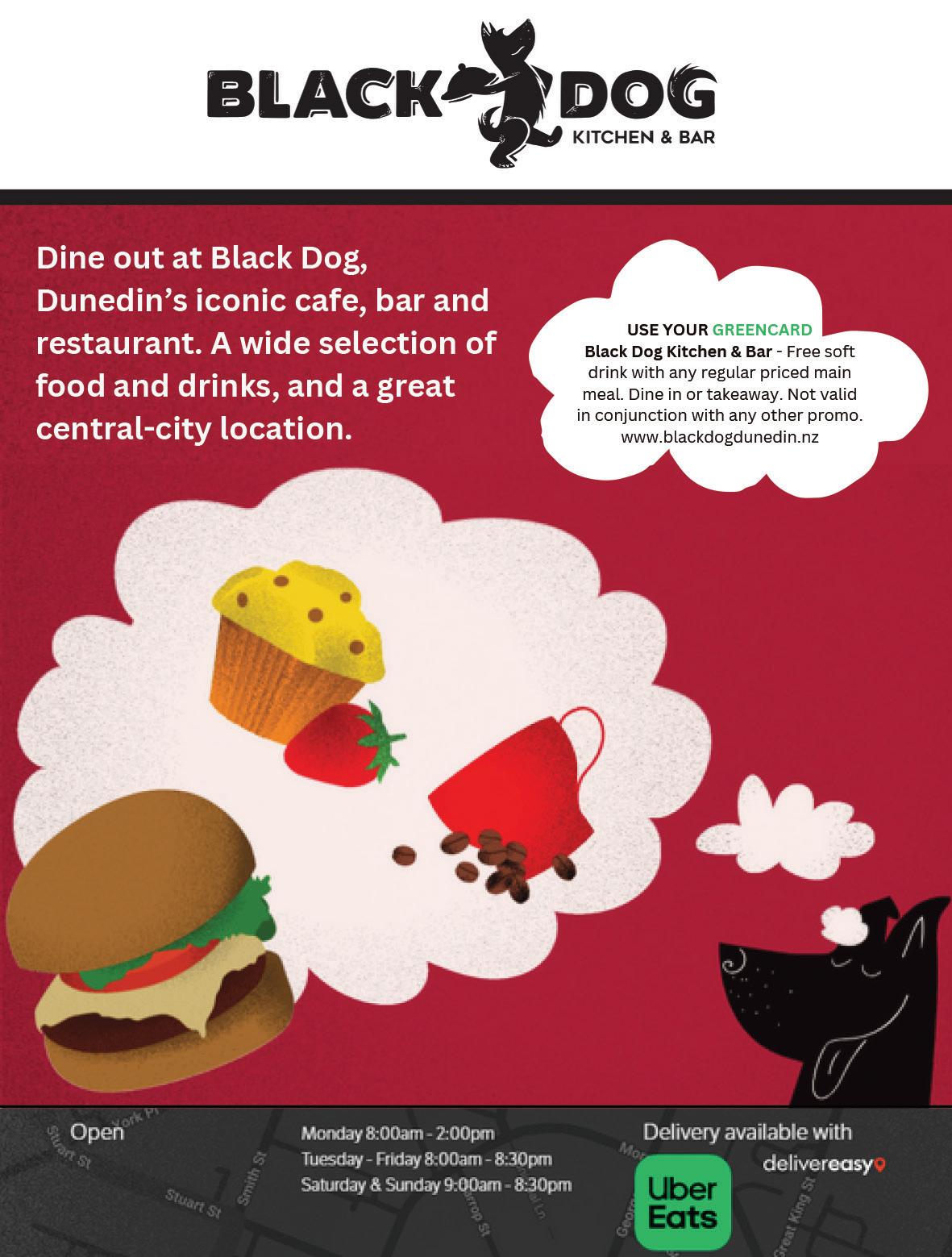



Flat drama is brewing like the cups of Earl Grey left in your kitchen. Try to stay out of the way of the crossfire and lock yourself in your room or the library.
Microwave meal to make: Mixed chicken and beef two minute noodles

You're torn between allowing yourself to be a social butterfly or studious (like you probably should). This week’s balance tips to spontaneity, but don't worry because next week is straight back into the library and on the books.
Microwave meal to make: Porridge
A hazy, dreamy cloud shrouds you this week. Life feels like a shoegaze music video and you can hardly get your tasks done. But you don’t give a fuck. This lack of anxiety is a dramatic change from your usual pedantic self. Bask in it.
Microwave meal to make: CupA-Soup
This week your caffeine intake is going to sky rocket to a problematic level. But this is directly proportional to how much work for last semester you have left till the very last minute. Try to work on setting realistic expectations with yourself, and don't have a heart attack.
Microwave meal to make: Leftover butter chicken
Post-break, you are feeling restless. A week off has given you a taste of freedom and you’re ready to get out of the city. Instead of scrolling Skyscanner in your lectures, settle for booking the bus to Queenstown.
Microwave meal to make: Popcorn
Secrets are floating around campus. If you are hearing whispers and you walk through the Link, you're not going crazy. Try to find out what they are saying or this gossip might blow up in your face when you least want it too.
Microwave meal to make: Bag of steamed veg
This week your ideas in class are either going to be creative and intelligent or totally unhinged and slightly problematic. Lean into this, not every time will you be perfect but hey, even a broken clock is right twice a day.
Microwave meal to make: A roast your mum sent down
You are feeling so excited about what you got up to during the break. But please remember that your tutor could not give less of a fuck that you went to Tekapo. Keep your stories for your grandma and flatmates.
Microwave meal to make: Frozen mac and cheese
You have hit the ground running and are as ambitious as ever. Try your hardest to keep this going for a while otherwise the burnout will hit by Friday. Remember slow and steady wins the semester, so take advantage of at least one of the sunny afternoons to relax and turn your brain off.
Microwave meal to make: A meal-prepped burrito
Mid-sem has lulled you into a false sense of security and now you have a big assignment due way sooner than you thought you would. Luckily your stubborn streak means you will power through and get a good amount done in the first couple days, however your habit for procrastination will be your worst enemy in the final hours.
Microwave meal to make: Pouch of rice and a tin of beans
You should be proud of the effort you put into going to lectures and keeping your notes organised. You will gain many little ego boosts from being the person all of your friends go to for notes when they miss a class. Try not to let that get to your head come exam season.
Microwave meal to make: Mystery container from the flat fridge
The ship is sinking. You felt great before the break but now everything is going to shit. You saw your situationship hooking up with someone else at Pint Night, your food goes mouldy hours after you've bought it, and it feels like your flatmates hate you a little bit more than last week. Try holding it together, you will be back on top of the world in no time.
Microwave meal to make: Chocolate mug cake

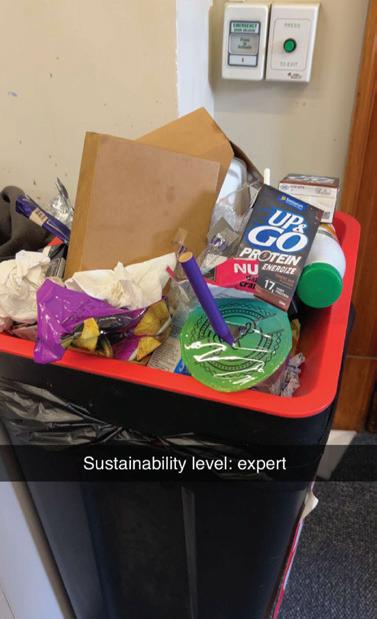


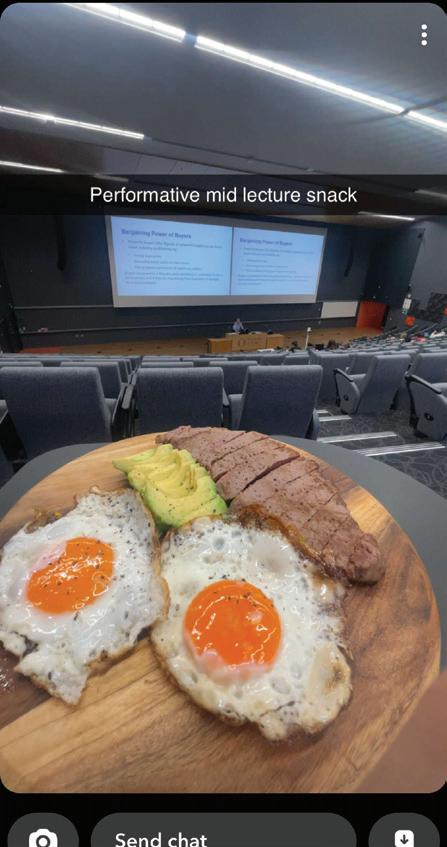
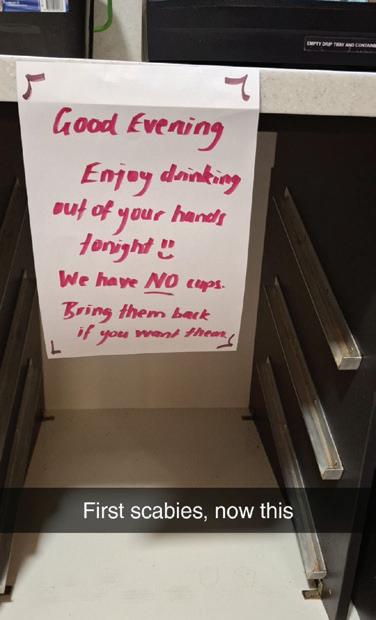


After two long, politics-free years, Politics Week is finally making its return – and honestly, it couldn’t come at a better time. This year, Ōtepoti students are getting front-row seats to one of the most underrated shows in town: local body elections. That’s right, the people who decide on everything from your bus timetable to whether your flat has to meet basic living standards are hitting the stage, and you get to grill them.
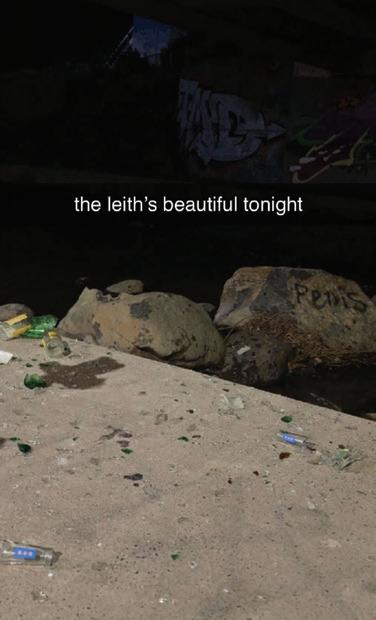


We’re hosting forums where candidates will be facing student questions, awkward silences, and hopefully the occasional “so what are you actually going to do about it?” Politics might feel distant when you’re buried under readings and trying to make rent, but here’s the kicker: around 90% of what affects your daily life is decided by your local council. Ninety percent. That’s the difference between flooding in South D and actually having climate resilience, between an affordable flat and one that makes you sick.
Politics Week isn’t about boring lectures or empty promises – it’s about putting faces to names, asking the questions that matter, and making sure students don’t get forgotten in the shuffle of “ratepayers” and “stakeholders.” It’s about proving that we’re more than just foot traffic in the Octagon or noise complaints in North D.
So come along. Sit in the back and heckle if that’s your vibe, or front row with a burning question if you’re feeling bold. Either way, show up. Because when students turn out, we remind the city that we’re not just passing through –we’re shaping Ōtepoti’s future. And that future starts with you, your vote, and maybe even your one-liner at a candidate forum.
Jett Groshinski OUSA Political Representative

